#it’s a place for everyone to discuss ideas and theories and interpretations
Note
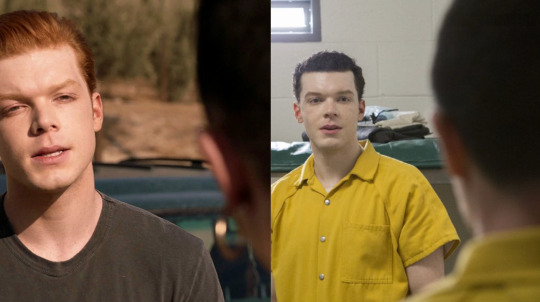
thoughts on this parallel?
the presumed last time they'll ever see each other (mexico border) vs. when it all falls back into place (prison reuniting)
i Adore the choice to film behind mickey and capture part of his body to let the audience in on such an intimate moment and experience ian's reaction from his POV.
i watched the show once it was all out on netflix but cannot even begin to comprehend OG gallavich shippers excitement seeing the prison scene and i think it would've been enhanced more with this excellent parallel - tying their 'ending' and new beginning together <3
and not to dive TOO deep but this same angle is used during The breakup scene at the end of s5... i don't know much about film this is all just stuff i'm noticing so i hope it makes sense and you or someone else out there appreciates the thought!
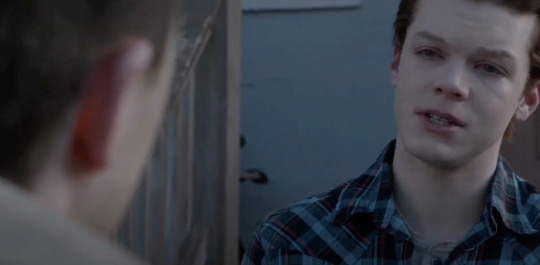
This is a very interesting parallel that I, personally, hadn’t noticed! 💖Thank you for pointing it out!
What do we all think of the choice to film these scenes this way? How does it make us feel as viewers? What are you’re thoughts on these parallels?
#gallavich#ian gallagher#mickey milkovich#ian x mickey#behind the scenes#acting#filming#question#parallels#also feel free to dive too deep!#that’s what this blog is about#it’s a place for everyone to discuss ideas and theories and interpretations
87 notes
·
View notes
Text
Examining SVSSS Canon: 2/∞
THE PRE-CANON TIMELINE
This post will attempt to provide an answer to several questions, including the ages of some of the current peak lords, as well as a rough timeline of events in the extras relative to the current day. A simple, bullet-point timeline will be at the end of this post, with relevant quotes and analysis above.
The timeline of SVSSS isn't particularly easy to piece together, and many fans are unsure of things such as the ages of certain characters, or how long the current generation of peak lords has been in power. As a matter of fact, it seems like even Airplane himself doesn't have a set timeline in mind for the events of PIDW pre-LBH:
“Your ages?”
To tell the truth, Shen Qingqiu didn’t really know the precise age of this body. He raised his head at Shang Qinghua. “Wouldn’t you know better than I do?”
Shang Qinghua twirled the brush in his hand. He’d never thought about this question either, so he figured he might as well just say whatever. Therefore he randomly wrote a number down in a couple of strokes.
(7 Seas, Ch. 31)
It would be easy enough to take this quote and call the timeline a mystery-- however, there are a surprising amount of clues in the text, enough to at least put together a decent idea of when things happened and how old certain characters are, depending on which theories and interpretations one ascribes to.
There are two particular facts which are our most important hints as to the pre-LBH timeline, upon which this entire analysis hinges.
First, we have the spacing of the Immortal Alliance Conferences:
After much difficulty, Luo Binghe managed to turn seventeen, at which point he finally participated in the event the cultivation world held once every four years: the Immortal Alliance Conference.
(7 Seas, Ch. 1)
And next, we have the length of time since Shen Qingqiu began to cultivate:
Before, Shen Qingqiu had thought that this body’s qualifications were already incredible, to have formed a core in only ten or so years when he’d begun cultivation so late.
(7 Seas, Ch. 19)
Notably here, what is translated as "ten or so years" is 十几年, which is more accurately "ten and a few years." This means that at the time Shen Qingqiu formed a golden core, he had been at Cang Qiong Mountain for around 10-15 years, but likely no longer or shorter than that.
This tells us quite a bit already-- because we know that Shen Qingqiu only reached core formation after becoming peak lord, as well as after Luo Binghe had already become a disciple:
Luo Binghe was using the incorrect cultivation manual that Shen Qingqiu had handed him; he should have long since died bleeding from the seven apertures, his body rupturing down to his bones, skin, meridians, tendons, and flesh...
Shen Qingqiu was filled with paranoia; he forever felt like everyone was secretly talking behind his back, discussing how he’d been unable to attain Core Formation even after this long.
(7 Seas, Ch. 24)
So this tells us that it could not have been any longer than around 15 years between Shen Qingqiu and Luo Binghe joining Cang Qiong Mountain, and was likely at least a few years less than that because it has already been awhile since Luo Binghe was given the fake manual, which likely occured shortly after he arrived, and Shen Qingqiu reaches core formation at some point after this scene.
This means that the Qing generation's ascenscion likely occured no more than ten years after Shen Qingqiu joined the sect-- putting the ages for Shen Qingqiu and Yue Qingyuan respectively at roughly twenty-six and twenty-nine when they became peak lords.
The timeline can be clarified further and expanded, however, due to the spacing of the IAC. We know that the IAC occured when Luo Binghe was seventeen, and that it occurs every four years-- meaning that there would have been IAC taking place also when he was thirteen, nine, five, one, and three years before he was born.
However, we also know that it had not actually been fourteen years since Luo Binghe's birth at the start of SVSSS.
In the translation, Luo Binghe says the following when Shen Qingqiu asks his age:
“This disciple is fourteen,” Luo Binghe obediently replied.
(7 Seas, Ch. 1)
However, the original says:
洛冰河乖巧地道:“弟子虚岁十四。”
"虚岁" here would be better translated as "nominal age." In ancient times, a child was one year old on the day of their birth, and aged up by one year with each new year-- so if a child was born the day before the new year, then at two days old he would already be counted as two years old. Sometimes, this would be counted on the spring festival new year, but other times it would be counted on the winter solstice.
As for Luo Binghe's precise chronological age, that is up for some determination. We know roughly the time of year he was born:
Immediately after birth, Luo Binghe was abandoned by his parents, swaddled in white cloth, and put in a wooden basin that was lowered into the Luo River. This occurred on the coldest days of the year...
(7 Seas, Ch. 1)
The "coldest days of the year" here is 数九寒天, which refers to the nine periods of nine days each following the winter solstice. The winter solstice typically occurs on December 20-21, meaning that Luo Binghe's birth date is somewhere between December 20-March 12. If nominal age is being counted by winter solstice in this world, then that makes him chronologically thirteen at the start of SVSSS, but if it is calculated by the spring festival, then he is chronologically either twelve or thirteen at the start of SVSSS, as the Chinese new year can fall anywhere between January 21 - February 21, meaning that LBH could have been born either before or after this time.
So, let's just say that LBH's chronological age, for the purposes here, is thirteen, and then adjust our IAC timeline as follows:
There was one when he was chronologically sixteen, twelve, eight, four, the year he was born, and four years before he was born.
Now, how does this help us determine a timeline?
Well, we have the following statement:
Yue Qingyuan’s knuckles slowly brushed along Xuan Su’s hilt. “I was able to meet Senior Su Xiyan once at an Immortal Alliance Conference, many years ago."
(7 Seas, Ch. 18)
Because we know that Su Xiyan died when Luo Binghe was born, we know that this meeting could not have occured at any conferences after his birth. It also would be unlikely that they met the same year Luo Binghe was born, as Su Xiyan would likely already be dead at that point if LBH was born after the new year. So, the latest that Yue Qingyuan could have met Su Xiyan would be twenty years before Luo Binghe was thrown into the Abyss.
We now combine this with the earlier discussion of the ages of Shen Qingqiu and Yue Qingyuan, and here I will note the following:
Yue Qingyuan slowly said, “At age fifteen, I entered Qiong Ding Peak."
(7 Seas, Ch. 21)
This puts Yue Qingyuan roughly three years older than Shen Jiu:
“When [Shen Jiu] was twelve years old, he was but a slave my family had purchased from traveling child traffickers. "
(7 Seas, Ch. 6)
Shen Jiu joined Cang Qiong Mountain at sixteen:
Liu Qingge didn’t even grace him with a sideways glance. “But certainly more success than a nobody who only began proper cultivation at age sixteen.”
(7 Seas, Ch. 19)
This happened most likely directly after reuniting with Yue Qingyuan at an Immortal Alliance Conference. This puts Yue Qingyuan's age at nineteen during that conference, at which point he is head disciple, and has already gained some fame. However, this reunion has to occur before Luo Binghe's birth, Su Xiyan's death, and Tianlang-jun's defeat. This is because at this point, Yue Qingyuan has only been in Cang Qiong Mountain for four years-- thus, this particular conference is almost certainly the first one he has taken part in, and likely the first one he has attended at all, since a brand-new disciple in early stages of training most likely wouldn't have gone, therefore if Tianlang-jun had already been sealed by this point, Yue Qingyuan would not have had the chance to meet Su Xiyan.
So, the latest Shen Qingqiu could have joined Cang Qiong Mountain, at age 16, is twenty years before the Abyss, which would put him at age thirty-six at the youngest at that time.
Now, what about additional conference cycles?
It's possible that the conference in which Yue Qingyuan met Su Xiyan and/or after which Shen Qingqiu joined CQM may have been the one before this-- but that would also add four additional years to the time SQQ had been cultivating.
The earliest that Luo Binghe could have joined CQM would be when he was a little over ten years old, as that is when his mother dies:
On the bed lay a haggard old woman. With great effort, she tried to prop herself up, but from beginning to end, she was unable to do so. A small figure rushed in from outside. A tender-faced Luo Binghe, only a little over ten years old, supported the woman. Around his neck hung that jade pendant.
(7 Seas, Ch. 3)
Shen Qingqiu had not reached core formation when Luo Binghe joined the sect. This means that if the IAC where SQQ joined the sect was four years before Luo Binghe's birth, then by the time Luo Binghe joins the sect it has been about fourteen to fifteen years since SQQ began cultivating.
Adding an additional four years would bump that to eighteen to nineteen years, which exceeds the "ten and some" years that SQQ took to reach core formation.
In my opinion, this also tells me that LBH joined CQM when he was absolutely no older than ten or eleven, and likely went to join immediately after his mother's death, because pushing LBH's join date later would also stretch the timeline of SQQ's cultivation. Now, this part does not specify whether the ten years old is nominal age or chronological age-- but because LBH's age of seventeen at the conference is referenced to his nominal age of fourteen, with a distance between of three years, then I am considering all age-numbers to be nominal age rather than chronological. This only really matters in regards to Luo Binghe for this analysis, though, as his birth year is the only one which has bearing on the timeline in regards to Su Xiyan's status.
With all of this information, we can determine with good confidence that the conference in which Yue Qingyuan met Su Xiyan was the same conference during which he reunited with Shen Qingqiu, which occured four years before Luo Binghe was born and twenty years before the Endless Abyss.
So because of this, we actually do have a relatively precise timeline of characters' ages, as well as events in the cultivation world.
This short timeline is also supported by the fact that Ming Fan is the most senior of Shen Qingqiu's disciples, and he is only sixteen, about 2-3 years older than Luo Binghe:
A youth around sixteen years old, tall and thin, promptly ran in through the door. “This disciple is here. What instructions does Shifu have?”
(7 Seas, Ch. 1)
Had the Qing generation ascended too many years prior to Luo Binghe's joining the sect, it would be strange that the most senior disciple of Shen Qingqiu's was only sixteen, as in xianxia a disciple typically will not "graduate" at a certain age or cultivation stage, meaning that older disciples will maintain their role well into adulthood.
As for the rest of the peak lords, we have little to no information regarding the ages of Wei Qingwei, Qi Qingqi, or Mu Qingfang. However, we do know that Liu Qingge is quite young, and joined the sect both at an optimal age and a significant length of time before Shen Qingqiu:
At this point, Liu Qingge’s formal ascension to Bai Zhan Peak Lord, too, had likely only happened a couple years ago. There was a visible air of immaturity about his features, his gaze fierce and sharp, and within his every action was a young man’s spirited vigor.
(7 Seas, Ch. 19)
and
Therefore, even though he’d entered the sect quite some time after Liu Qingge, because Qing Jing Peak was ranked second—only below Qiong Ding Peak—while Bai Zhan Peak was ranked seventh, Liu Qingge still had to address Shen Qingqiu as “Shixiong,” if through gritted teeth.
(7 Seas, Ch. 24)
So, Liu Qingge is likely a year or two younger than Shen Qingqiu, but not by too much, since they still behave very much like contemporaries as teenagers-- let's say that Liu Qingge is likely around 14-15 when Shen Qingqiu joins the sect at age 16.
The other peak lord we know a bit about the age of is Shang Qinghua:
The older-than-average outer disciple Shang Qinghua, who currently occupied a seventeen-year-old body, looked around in all directions as he trailed behind the main team, who were unloading goods from the ship onto the docks.
(7 Seas, Ch. 26)
He is seventeen here, and an outer disciple of An Ding Peak. We can place this a bit more definitively on the timeline by the fact that Shen Qingqiu is already a head disciple at this point in time:
“What I don’t know is how Shen Qingqiu got chosen as head disciple after starting cultivation so late,” said another outer disciple who’d joined Cang Qiong Mountain at an older age, his expression sour.
(7 Seas, Ch. 26)
Unfortunately, we cannot place the exact point in time where Shen Qingqiu became head disciple-- one possibility is that it couldn't have happened until after Tianlang-jun's defeat, which occured about four years after he joined the sect, since he did not participate in the battle. But that is a weak argument, since none of the current generation besides Yue Qingyuan participated in that battle:
Of the current peak lords, only Yue Qingyuan had participated in that battle, as the head disciple of Qiong Ding Peak.
(7 Seas, Ch. 17)
If using this argument, then that would mean that aside from Yue Qingyuan, none of the other peak lords had been chosen as head disciples at that time-- while that is a possibility, I think that a more feasible explanation would be that Yue Qingyuan was an exception, and participated in the battle specifically because of his wielding Xuan Su.
One thing we can extrapolate, however, is that Shang Qinghua was most likely an inner disciple for at least three years before the Qing generation's ascension. This is because of the following:
One day, Shang Qinghua’s concise Great System delivered a new command: Become the An Ding Peak head disciple within three years.
(7 Seas, Ch. 26)
Now, it is somewhat loose evidence, as there is nothing to say that "three years" means for certain that the ascension would occur three years from that point, but it does mean that it occured no earlier than that. By now, Shang Qinghua has already been an inner disciple for some time, long enough to have been assisted by Mobei-jun a few times and to have gone on several missions-- most likely around a few months to a year or so at minimum.
Of course, how long has passed between Shen Qingqiu joining the sect and this point? Well, since Shen Qingqiu is still described as a youth:
Shang Qinghua suddenly heard the tinkling of sword tassel pendants, and a youth wearing Qing Jing Peak’s uniform slowly approached him.
(7 Seas, Ch. 26)
Because of this description, I would say that Shen Qingqiu is most likely between seventeen and his early twenties, since it isn't particularly likely that he would become head disciple in less than a year after joining the sect. Of course, within this age range, there is one important event that occurs-- the battle of Bai Lu mountain, which would have occured when Shen Qingqiu was twenty and Yue Qingyuan was twenty-three.
Now, this gets into more of a speculation than anything else-- just before this point, Mobei-jun attacked Huan Hua Palace and the An Ding Peak disciples. If the battle of Bai Lu Mountain had already occured, it would have happened no more than a few years earlier. We also know that there is a tentative truce between the demon realm and the cultivation world:
This suggestion was solid. For many years, the Human and Demon Realms had maintained an uneasy balance and had yet to drop the pretense of peace. Eliminating Sha Hualing and her mob wouldn’t be impossible, but it would likely light a fuse. The demons definitely wouldn’t let her death go unanswered, and it wouldn’t be worth it if they stirred up an even greater conflict.
(7 Seas, Ch. 3)
I suspect that this pretense of peace was likely set in place after the battle of Bai Lu Mountain, when the demon realm had just lost their ruler.
Since just a short time had happened since the demons' defeat and a likely truce between the realms, I find it unlikely that Mobei-jun, a prominent member of demonic nobility, at this time would be actively antagonizing the cultivation world by attacking Huan Hua Palace and Cang Qiong Mountain. Now, of course, there is a potential alternate storyline that this is exactly what happened, and Mobei-jun went rogue as an act of lashing out, and that interpretation would be perfectly valid on its own.
Personally, though, I believe that Shang Qinghua's meeting with Mobei-jun occured before the battle of Bai Lu Mountain, while the cultivation world and demon world were in the tense state on the edge of war. This means that Shang Qinghua most likely became an inner disciple when Shen Qingqiu was around 17-19 years old.
With this information, we can determine some relative ages:
Yue Qingyuan is three years older than Shen Qingqiu, who is a little older than Liu Qingge. Because Shang Qinghua was seventeen when Shen Qingqiu was already head disciple, it is most likely that he is around Liu Qingge's age, give or take a few years, as it is not particularly likely (though potentially possible) for Shen Qingqiu to have gone from new disciple to head disciple in the space of a single year.
Aside from these four, there are no other ages that can be determined for the peak lords.
With all of this information, a fairly decent timeline can be created. Characters' ages will be listed with each notable year.
《 THE TIMELINE 》
*counted up to the start of SVSSS.
If using this timeline, keep in mind that the earliest and latest notes for date ranges can overlap-- do not accidentally have a disciple join the sect before the current peak lords ascend, or have SQH become head disciple after ascension! Dates with ranges are colored green (earliest) and red (latest).
Earlier than -21 YR
LQG: <;10-11
(earliest) Liu Qingge joins Cang Qiong Mountain
-21 YR
LQG: 10-11, SQQ: 12, YQY: 15, QHT: <16, QJL: 16
Shen Jiu sold to Qiu Jianluo
Yue Qi joins Cang Qiong Mountain
--IAC--
-19 YR
LQG: 12-13, SQQ: 14, YQY: 17
(earliest*) Yue Qingyuan enters the Lingxi Caves with Xuan Su
-18 YR
LQG: 13-14, SQQ: 15, YQY: 18, QHT: <19, QJL: 19
(latest*) Yue Qingyuan enters the Lingxi Caves with Xuan Su
Shen Jiu kills Qiu Jianluo and burns down Qiu Manor
Shen Jiu becomes Wu Yanzi's disciple
(earliest*) Yue Qi leaves the Lingxi Caves
(earliest*) Yue Qi becomes head disciple
(latest) Liu Qingge joins Cang Qiong Mountain
-17 YR
LQG: 14-15, SQQ: 16, YQY: 19
(latest*) Yue Qi leaves the Lingxi Caves
(latest*) Yue Qi becomes head disciple
--IAC--
Yue Qingyuan meets Su Xiyan
Shen Jiu kills Wu Yanzi and joins Cang Qiong Mountain
-16 YR
LQG: 15-16, SQH: 15-17, SQQ: 17, YQY: 20
(earliest) Shen Qingqiu becomes Head Disciple
(earliest) Shang Qinghua meets Mobei-jun and becomes inner disciple at age 17
(earliest) Shang Qinghua receives the directive to become head disciple within three years
(earliest) Shang Qinghua becomes head disciple
-14 YR
MF: 2, LQG: 17-18, SQH: 17-19, SQQ: 19, YQY: 22
(latest) Shen Qingqiu becomes Head Disciple
(latest) Shang Qinghua meets Mobei-jun and becomes inner disciple at age 17
(earliest**) Su Xiyan imprisoned and subjected to torture in Water Prison
(earliest**) Battle of Bai Lu Mountain
(earliest**) Tianlang-jun Sealed
-13 YR
NYY: <1, LBH: 1, MF: 3, LQG: 18-19, SQH: 18-20, SQQ: 20, YQY: 23
(latest**) Su Xiyan imprisoned and subjected to torture in Water Prison
(latest**) Battle of Bai Lu Mountain
(latest**) Tianlang-jun Sealed
Luo Binghe is Born
Su Xiyan Dies
(earliest) Qing Generation ascend to become Peak Lords
--IAC--
-11 YR
NYY: 2-3, LBH: 3, MF: 5, LQG: 20-21, SQH: 20-22, SQQ: 22, YQY: 25
(earliest***) Ming Fan joins Qing Jing Peak under Shen Qingqiu
-9 YR
NYY: 4-5, LBH: 5, MF: 7, LQG: 22-23, SQH: 22-24, SQQ: 24, YQY: 27
--IAC--
-8 YR
NYY: 5-6, LBH: 6, MF: 8, LQG: 23-24, SQH: 23-25, SQQ: 25, YQY: 28
(latest) Shang Qinghua receives the directive to become head disciple within three years
(earliest***) Ning Yingying joins Qing Jing Peak under Shen Qingqiu
-5 YR
NYY: 8-9, LBH: 9, MF: 11, LQG: 27-28, SQH: 27-29, SQQ: 29, YQY: 32
--IAC--
(latest) Shang Qinghua becomes head disciple
(latest) Qing Generation ascend to become Peak Lords
(latest) Ming Fan joins Qing Jing Peak under Shen Qingqiu
-4 YR
NYY: 9-10, LBH: 10, MF: 12, LQG: 28-29, SQH: 28-30, SQQ: 30, YQY: 33
Luo Binghe's adoptive mother dies
(earliest) Luo Binghe joins Qing Jing Peak
(earliest) Shen Qingqiu reaches Core Formation
-3 YR
NYY: 10-11, LBH: 11, MF: 13, LQG: 29-30, SQH: 29-31, SQQ: 31, YQY: 34
(latest****) Ning Yingying joins Qing Jing Peak under Shen Qingqiu
(latest) Luo Binghe joins Qing Jing Peak
-2 YR
NYY: 11-12, LBH: 12, MF: 14, LQG: 30-31, SQH: 30-32, SQQ: 32, YQY: 35
(latest*****) Shen Qingqiu reaches Core Formation
-1 YR
NYY: 12-13, LBH: 13, MF: 15
--IAC--
Year 0
NYY: 13-14, LBH: 14, MF: 16
SVSSS Begins
-----
This timeline operates under the following conditions. For some of these conditions, alternatives are discussed in the post above-- if you wish to use any of the alternative calculations, then you're more than welcome to adjust the timeline as applicable for your own use!
"Years" are counted from the first day of the spring festival/Chinese new year, rather than January 1
All character ages are nominal ages, so they were born in the year they are counted as age "1"
Luo Binghe was born after the new year, and so his nominal age is only about one year higher than chronological.
Shang Qinghua met Mobei-jun before the battle of Bai Lu Mountain
The system's time limit for SQH does reference the time of the Qing generation's ascension
The Immortal Alliance Conference takes place roughly in the middle of the year. Based on the fact that it is warm enough for the disciples to dip their feet into a stream and find that pleasant, it would make sense for the IAC to occur in a warmer season (Ch. 4)
Further References and Footnotes:
*Yue Qi was in the Lingxi Caves for more than one year and Qiu Manor had already been destroyed by the time he got out (Ch. 21)
**The birth of Luo Binghe occured a few days after the battle of Bai Lu Mountain. Depending on when LBH was born, it could be at the end of year -13 or the first few days of year -12 (Ch. 21)
***We do not know the earliest a child can join Cang Qiong Mountain, even though the appropriate age for cultivation most likely cuts off somewhere around 15 (due to YQY joining at that age and no comments about him being "too old"). For the purposes of this timeline, I am setting the absolute youngest to age 5, but more realistically a disciple wouldn't join until age 8-10 at the earliest.
****It is unknown whether the only time that disciples can join Cang Qiong Mountain is during the recruitment trials. Therefore, there remains a possibility for Ning Yingying to have joined the sect in the same year as Luo Binghe, but at some point before the recruitment trials due to connections. This can potentially be supported by Shen Jiu joining after the IAC, but at the same time, it is not confirmed that SJ joined CQM immediately, or if he had to wait until the next recruitment trial, so there is no clear canon precedent-- nonetheless, it is still possible. Note that Ning Yingying can only join at this late point if Luo Binghe joins at age 11, and after her. The only hard requirement is that NYY joined at some point before LBH.
*****I have placed this as the absolute latest time SQQ could have formed a golden core because this puts him at having been cultivating for sixteen years. It is a bit of a stretch already , but I don't think that "ten and a few" years could really be any longer than this. It is also worth noting that by the time SQQ reaches core formation, every other peak lord has already done so, with Yue Qingyuan first, Liu Qingge and Qi Qingqi next, and Shang Qinghua most likely last (Ch. 24)
--
Please let me know if you notice any errors in calculation, formatting, or missing details! This was quite substantial so there's a good chance I may have missed something.
Some of the points in this analysis and timeline calculations were brainstormed with the help of @zykamiliah , @cum-villain , @furbygoblinxiv . Many thanks!
#svsss#canon examined#shen qingqiu#luo binghe#yue qingyuan#liu qingge#shang qinghua#svsss timeline#resource
496 notes
·
View notes
Note
Hello! With the discussion of Yoshida with your recent analysis, what's your perspective on Yoshida offering Denji the choice before: of being chainsaw man or having his family and how much of that was Yoshida enforcing his own ideas of what's good for denji vs his efforts to help denji in the limited scope of his position? I feel like this could have been talked about before on the blog but with added context from csm 156 interested in how this develops too
Denji is Yoshida's reflection that he refuses to see
The answer might be easy if I aligned myself with my own position, the one I established in my analysis 156, which attempts to theorize that Yoshida is on Denji's side
But you know I know I haven't convinced everyone with my blindness around Yoshida's hidden goodness. So I'm going to answer your question, but from the opposite position: let's explain Yoshida's reactions, whether as a non-ally of Denji or as an enemy.
I know this may confuse you because you'd like me to analyze chapter 133 in relation to what I analyzed about chapter 156. But even if I assumed the opposite, I would have come to the same conclusion.
I love Yoshida, and even though I seem to have left him out of my analyses, I've always reflected on every one of his interventions. And something strikes me, Yoshida often seems to be talking to himself, even deluding himself almost as if to hold on.
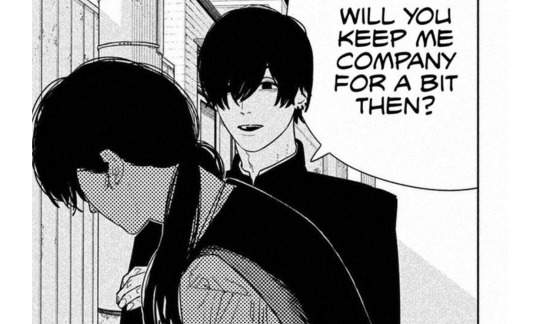
In chapters 120/121, Yoshida invites Asa. Now fans (like me!!!) are fantasizing about rivals, a fake love triangle and a date. But in reality, it all falls depressingly flat.
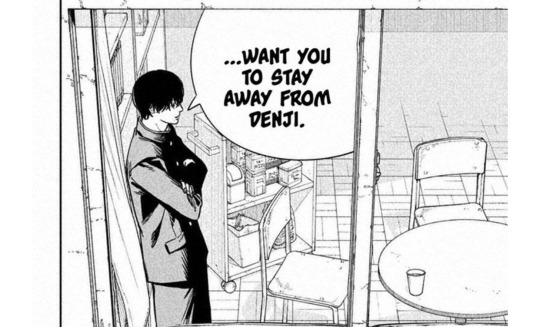
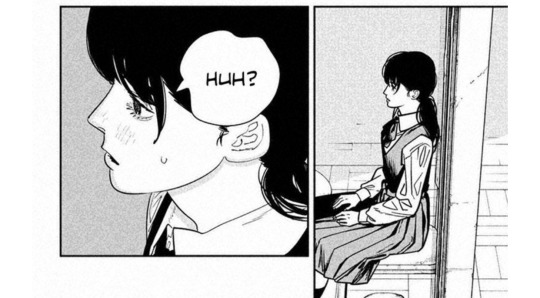
But this chapter remains interesting for two reasons: two people share their experience of solitude as the only way to avoid disappointment and be happy. However, Asa projects herself into a possible love with Yoshida.
It's like reciting something to convince yourself but secretly wishing for the opposite…
But what's interesting is that we take the position of thinking that everything Yoshida said was linear.
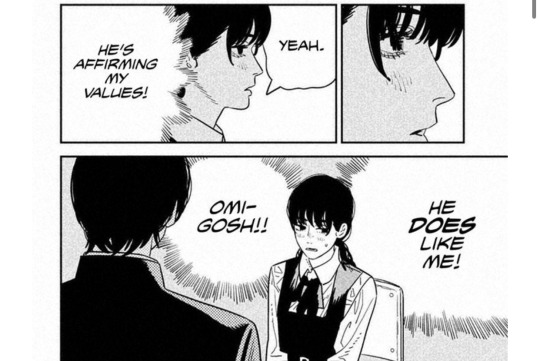
Let's review. Yoshida knows that Asa was leering, that she looked depressed, and since he's watching Denji, he must have known about the date, hence the warning that comes later. So why get involved? As Asa's Nayuta-altered memory made him the executioner, why make her pain worse?
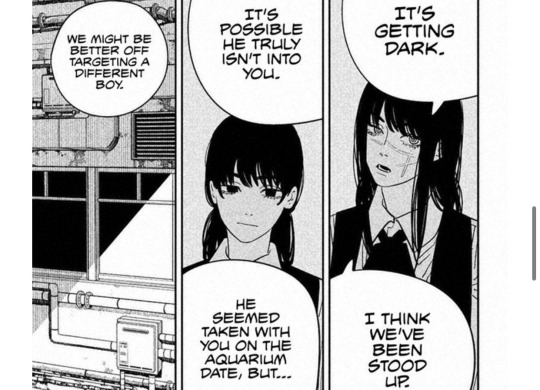
Because Yoshida must have had a childish reaction. It's as if, for once, he hadn't quite accepted his role as a spectator of events. I think Yoshida must have seen himself in Asa in some way. In chapter 121, Asa is all silence and Yoshida is for once almost in monologue. It was as if everything he said would convince him a little more out loud. Whether it was his theory of happiness up to........ "stay away from Denji". That point. Part of the points that concern him as much as they concern Asa.
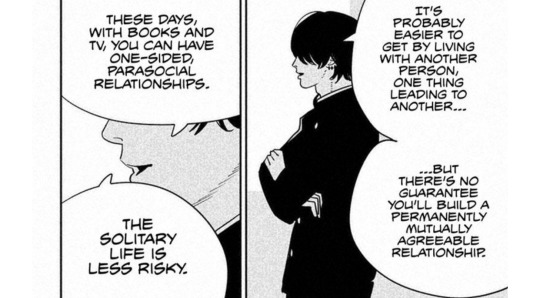

I think and I'm convinced that even by not interpreting Yoshida as an ally, he became more sensitive and involved with Denji's plight and didn't always know how to place an emotional wall between them. Because Denji catches him off guard, makes Yoshida's smiling mask fall off. And this is something I've never verbalized before, but it's a pillar in my interpretation:
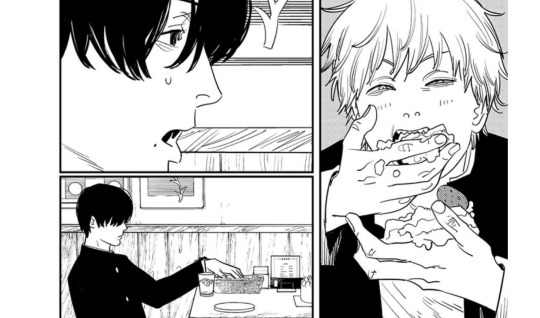
Being with Denji pushes you to be yourself.
Because Denji refuses the social game, doesn't tend to judge as teenagers of this age usually would, and has extremely sincere reactions that are so unpredictable that they don't allow for calculated responses, responses that form the shell of other characters like Asa and Yoshida.
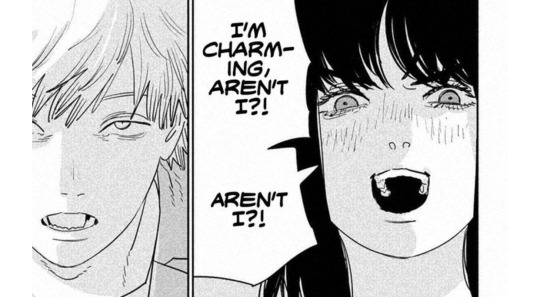
What Asa liked about Denji, above all, was that he was able to give her confidence and make her proud when everyone else was putting her down. You don't like fish, so what? Eat starfish. Because yes, even if it was boring, I saw you, I listened to you and you made an impact on me. Because you're not insignificant.
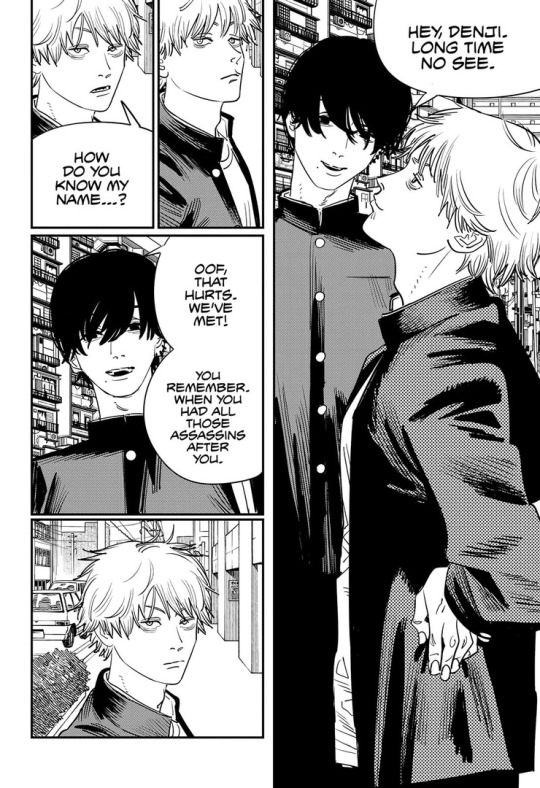
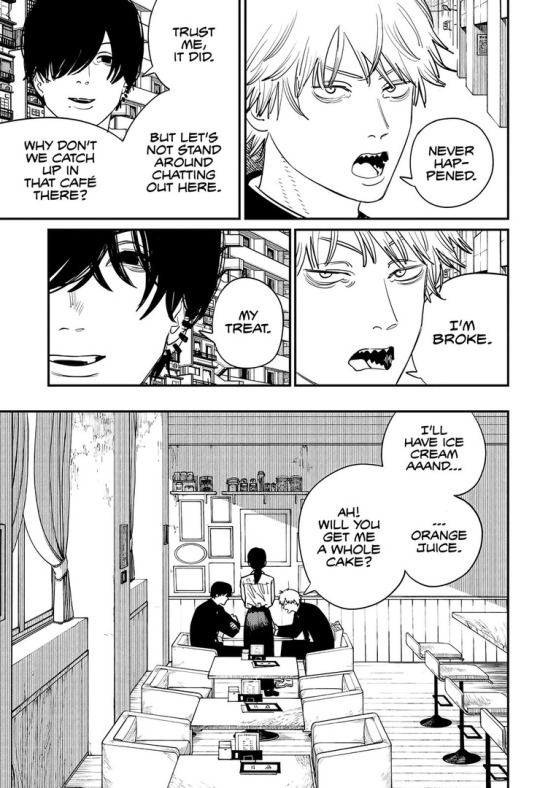
Denji has that effect on Yoshida. Very symbolically, during their new interaction in part 2, the protagonist doesn't remember Yoshida. Of course, it's quite funny, because it can be interpreted in all sorts of ways, like the fact that Denji is so uninterested in guys that he forgets them so easily. But it's symbolic for Yoshida's character. He's so fake and so in control that Denji doesn't perceive anything in him.
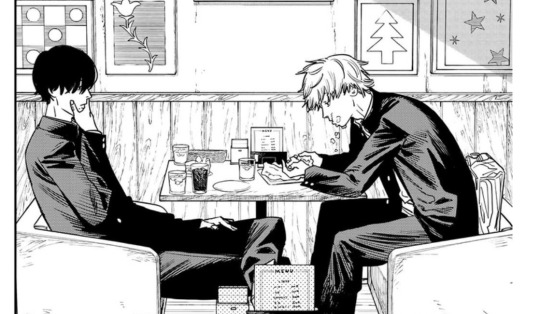
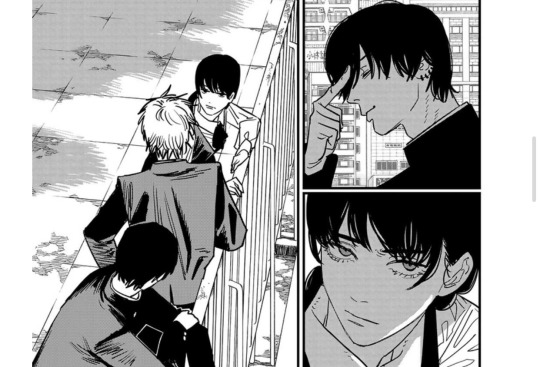
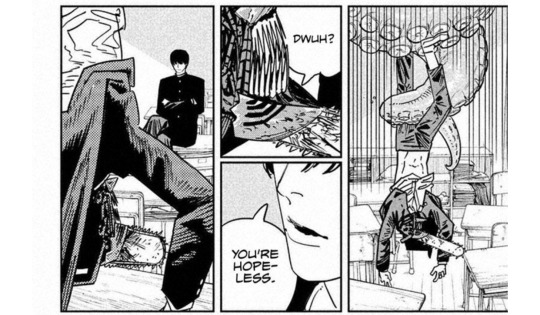
And it's when he becomes more and more desperate as a result of these reactions, and when his mask gradually breaks, that Denji finally remembers his name. Because Yoshida acts less like a public hunter and more like himself, like Yoshida.
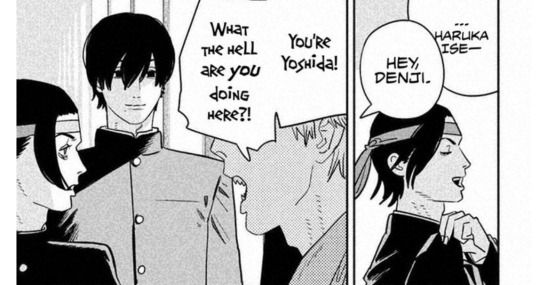
I think in chapter 133, it's really a way of trying to wake Denji up and help him. But then again, it helps to weaken Yoshida's mask. When Yoshida repeats that Denji has only two choices, that of his family or Chainsaw Man, Denji repeats that he has two. From Yoshida's point of view, this is fundamental.
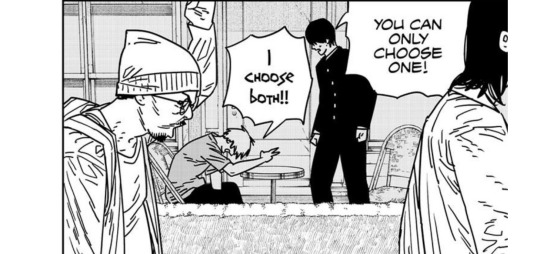
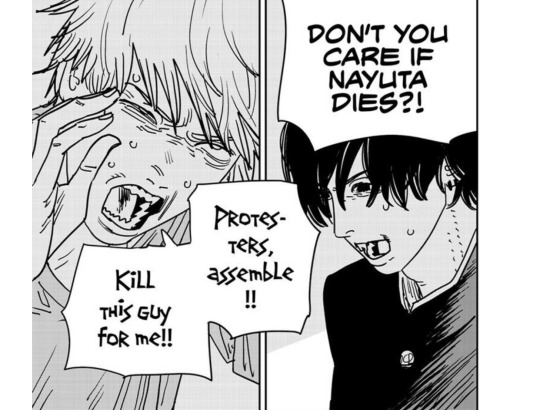
The system offers only one choice, only one possible path. But Denji opposes both. In a chapter about protest, we also talk about his position towards the system. Oppose it, protest as if in the background, claim the symbol of Chainsaw Man or oppose it, see it as a societal evil, a danger of undermining the system. For I repeat, Yoshida has decided to believe in the system when Denji distrusts it.
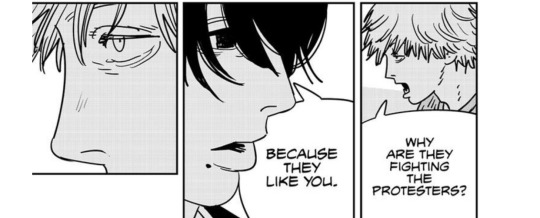
So Yoshida gets angry, belittling Denji as if he can't see the absurdity of this dilemma imposed on a boy who has been given a choice. Who was only told there were only two choices when there were three. Rehearsing allows Yoshida to convince himself, but we see that this controlled mask has completely disappeared, giving way to anger and a kind of panic. Because Yoshida's ideals are unravelling.
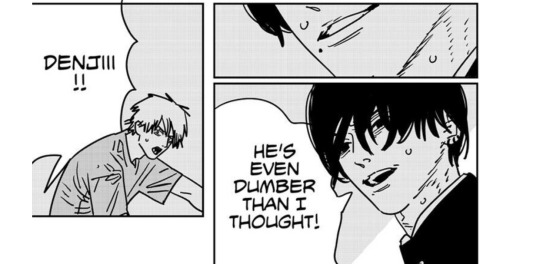
Denji is a reflection.
Reflecting the cruelty of the mafia that Katana doesn't want to admit, the dream of going to school that Reze is trying to forget, allowing the trust that Asa thought impossible and the reflection of Yoshida: a teenager, who will trace a third path to the two that will be reserved for him.
If Chainsaw Man allows you to project what you want, have or be in him, hence the pandemic of CSM wannabe. Denji, hidden behind it, is doing something far more unbearable: showing us who we are.
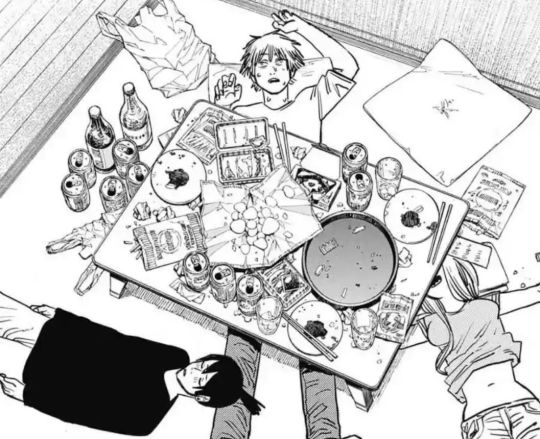
Aki's vengeance gives way to a desire to be surrounded by loved ones, loved ones he may not be able to protect. Thinking only of oneself shows Power, through her sacrifice for Denji, that she is capable of love even if it goes against her survival.
So chapter 156 takes on a softer version. I repeat: why did you wake Denji up just to tell him he'd lost?
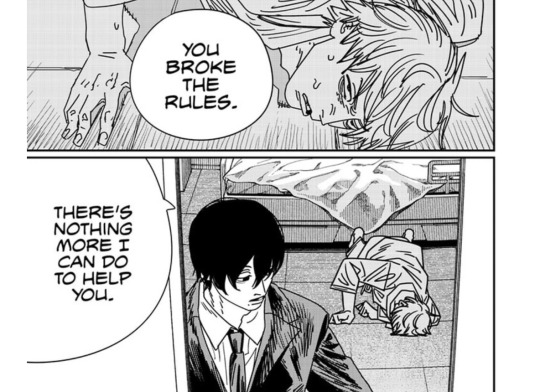
That Yoshida had warned him? Once again, through a strategy of self-conviction and self-protection, what Yoshida is doing is reminding us that complete alienation from the system is better than individual affirmation (which is what Denji is punished for, having repeated that he is Chainsaw Man). This identical public hunter's costume is the symbol of this submission. Yoshida is no longer even a fake high-school student. He's just a public hunter.
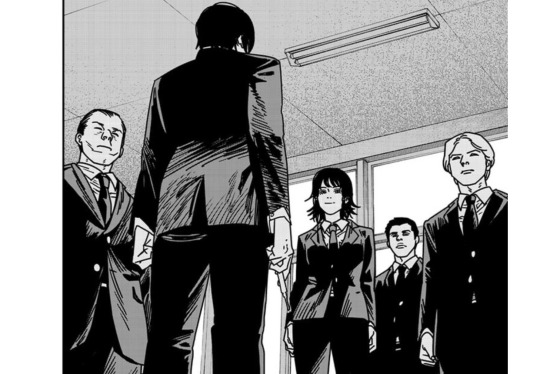
But I find this chapter takes on an air of funeral and goodbye. Yoshida's costume, taking on that of someone in mourning in a symbolic way.
Because saying goodbye to Denji.
It means saying goodbye to yourself.
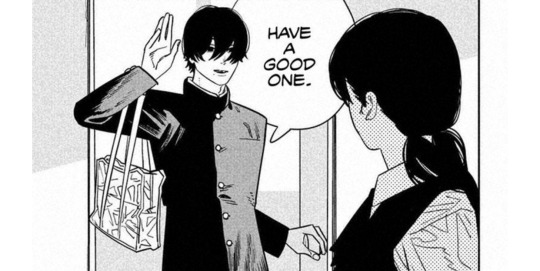
So I ask you, Anon, and you, the reader, does Yoshida really want to continue refusing to see his reflection ?
#chainsaw man#csm#csm part 2#csm spoilers#denji#yoshida#yoshida hirofumi#asa#asa mitaka#my thoughts#csm 156#csm 121#csm 133#ask#<3
112 notes
·
View notes
Text
On Puppets, Agency, and Fate
I’ve been writing this thinkpiece for around a week while looking further into Welcome Home’s symbolism through queer/neurodivergent lenses; strengthening my belief that its themes of freedom and fate cannot be separated from the struggles the characters face as queer/neurodivergent folks.
This writing is going to be a mix of canonical content and my personal interpretation as I make many connections to various readings. Not to mention that the story is very far from done according to the words of the creator himself, so please take the things I say with a grain of salt.
You can view this thinkpiece in Google Docs format here.
CW: mentions/discussions of homophobia, transphobia, ableism, and abuse
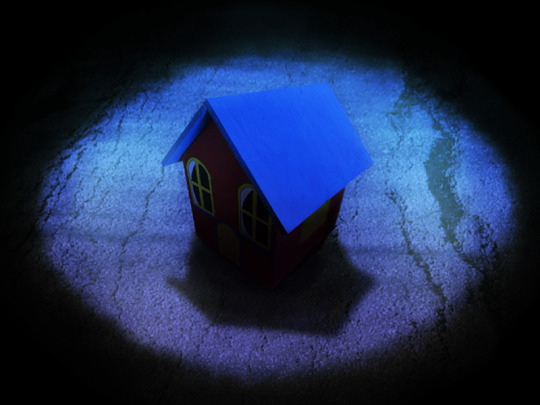
I've always adored explorations of humanity and their deteriorating, fluctuating psyche through characters constantly challenged by the narrative (example: Phos from Land of the L*strous, Kris from D*ltarune, Guts from B*rserk, Mae from N*ght in the W*ods) and how they struggle to find their place in the world and freedom. To progress, humanity has always desire freedom. Freedom of expression. Freedom to think. Freedom to honestly, unapologetically be who one wants to be. Humans and humanity are not always synonymous. Welcome Home is a case of this too, its ensemble cast consisting of puppets.
Clown has stated that themes of being queer/neurodivergent are very integral to the story in many aspects, from the characters to the metanarrative. I want to talk about the things I've noticed, the analogies they carry, and how every character's identity contributes to the themes or the story.
First off, the neighborhood.
The neighborhood in general
From the perspective of Welcome Home Puppet Show’s creators, the neighborhood is the idea of a perfect, idyllic community through the lens of cisheteronormavity from the 70s. It is something out of a children’s dream with the colorful imagery, the peaceful yet eventful neighborhood filled with fun activities where everyone in the neighborhood is happy and there are no realistic problems like capitalism, oppression, relationship problems, sickness, and death. Of course, it’s the given obvious because this is a puppet show we’re talking about. A show aimed at kids.


Everyone has a role to play in the neighborhood – the shopkeeper, the mailman, the baker, the bug nerd – they all fit the traditional, stereotypical, cartoonish American mold of what the dream urban life is like in the 70s (and it still is in my small hometown, in Indonesia! We’re quite traditional in a sense) especially with the lack of serious overarching threats of aforementioned human problems.
Welcome Home first aired on 1969 and abruptly ended on 1974. A possible theory is that they cannot keep up with the competitor shows at the time (Sesame Street started on 1969 and The Muppet Show started on 1974, fun fact!), but seeing the amount of merchandise they put out and the way it stood out from various angles, this theory can be thrown out the window. The “about” page for WHPS also describes the show as well acclaimed and doing well during its runtime.

Another one is that the sentience of the puppets (and their desire to have autonomy over their own lives) have possibly impacted the writing of the story, given how they have their own identity outside of the one given by WHPS’s writers to them. Even more when you take into consideration that WHPS is produced during the era when LGBT history in America is at a major turning point. As cited from The Atlantic:
“Those years that followed, the decade of the 1970s, represent a remarkable period of transformation for gays and lesbians, particularly those living in America's coastal cities. At its core, that transformation was about visibility. During those years, there was the first gay television movie (That Certain Summer); a sexy on-screen kiss between two men in Sunday, Blood Sunday; and the release of Cabaret, which has been hailed as the first movie that "really celebrated homosexuality.
There were gains in politics too: Edward Koch, then serving in Congress, "became one of the first elected officials to publicly lobby on behalf of the homosexuals of Greenwich Village," Kaiser writes. Gay Pride Week was established. Perhaps most significantly: In December of 1973, the board of the American Psychiatric Association* voted 13-0 "to remove homosexuality from its list of psychiatric disorders."
The laws that no longer criminalizes or dehumanizes queer folks are being written. Changes are made. Even when LGBT movement was going on a fairly optimistic path, oppression and bigotry towards the community was still rampant. After all, oppressors just can’t change their views in a whim! Their hatred comes from their own thoughts and not because the higher ups told them so.
I won’t turn this into a writing about queer history instead of focusing on Welcome Home. Though, I think it's all worth mentioning given the things I'm going to discuss here and how Clown stated that these themes will become prevalent throughout the story. I decide to write this thinkpiece as an outlet for my thoughts and how I connected many of the story's aspects to the themes of freedom – both from their status as puppets and their identity.
Now that the overview is out of the way, time to bring in the big guns.
The neighborhood and Playfellow Workshop
If we take Playfellow Workshop's involvement in the characters' lives outside of episode recordings, Welcome Home becomes a huge transgender allegory, wrapped in a neat colorful package called "being puppets whose view on the world is much more narrow and simple in which they are controlled by beings above their comprehension".
Playfellow Workshop is the company that creates WHPS and owns its characters. They act as the "parents" to the "children" – WHPS' characters – in this comparison. They house the characters, have them as their responsibilities and assets, and, as any show production goes, they most definitely have staff that takes care of the puppets to see if there are any rips or tears in their bodies, making sure they are fit for the show production. It's just like how parents house their children when they cannot afford housing or live on their own, taking care of (or rather monitor) them, giving them shelter and food.
They are controlled both literally and figuratively by Playfellow Workshop – former because they're hand puppets made for children's entertainment and latter because of their status binding them to their duties. Just like how a parent has authority over their children under the guise of “you live under my roof, you live under my rules.” The rules in questions are the episodes which are produced on story scripts, and the puppets follow said scripts.

Playfellow Workshop is extremely important to the puppets, whether the company is taking a positive role, a neutral role, or an antagonistic role. If the puppets were to break free from their grasp, who would take care of them? Who will place them onto their cases, or fix their rips and tears, or make sure they're in good shape? Playfellow Workshop may have taken a toll on the puppets, but no one can take care of the puppets better than Playfellow Workshop.
You might be wondering, “But Senja, this can be read as a typical controlling parent and clueless children dynamic. Why so specific about it being a trans experience?”
It can be read like the former! I made more connections and thus thought "Hm. This is so true to my trans experience".
There are multiple transgender characters in the story such as Frank, Poppy, and Julie. I was struggling on how to put my thoughts into words about the ways the producers of WHPS (could it be that they thought about the puppets not being cis?) can write in trans characters in WHPS, but I believe Clown himself and the wikipedia page for Gonzo from The Muppets said it best.
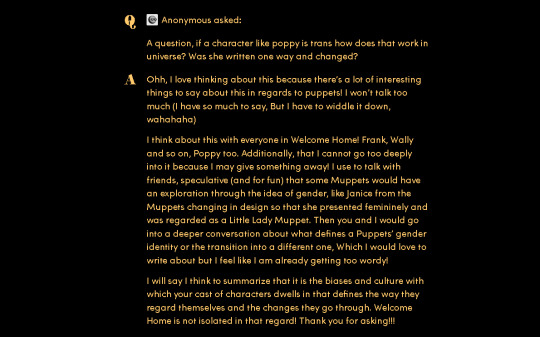

A similar case for the puppets can be applied to the trans characters of Welcome Home! Still, the way the puppets present themselves to the audience is also ultimately a decision made by Playfellow Workshop, especially during episode recordings. Clown also said that they won’t reveal much about it since he doesn’t want to give out spoilers. Perhaps regarding to the nature of Playfellow Workshop, too?
The puppets and the scripts can also be a stand-in for how trans folks who still live with authoritative adult figures (especially those that don't accept them or begrudgingly does) are handling autonomy over their own bodies and actions. Although not shown for now, I predict there’s going to be an eventual identity dissonance between who the puppets truly are and who the puppets are according to WHPS’ writers. It reminds me of my experience of when I was much younger, being a closeted trans person who often struggles with disassociation, looking into the mirror and feeling like me and my body are not one. Not myself. It's like they're two separate beings, "me" who is what I truly am, and "my body" that is dictated and dressed up by my parents. As much as I love my body, little me wanted to claw out and break free if it means I can have a semblance of independence over my life. (Things are much better these past few years, though!)
Again, I don’t like accusing Playfellow Workshop of purposefully mistreating the puppets or even taking pleasure in hurting them because we are just getting started; getting to know the personalities and character dynamics between each character. Authoritative parents won't exactly be abusive to their children. Maybe Playfellow Workshop is just doing their job. They take care of the puppets because if they're damaged, the show won't go on. They act indifferent towards the puppets because well, they're just puppets. No personal feelings. That's just how business goes.
We do know that Playfellow Workshop is a big problem regarding the WHPS’ cancellation and the puppets’ worrying fates.
Playfellow Workshop aside, what about the community regarding the puppets?
The neighborhood is a small town consisting of nine residents. Everyone knows each other, and it’s hard to keep secrets from one another with just how tight-knit everyone is; the experience of living in a small town rings true to mine. Almost everyone in my quaint hometown knows many details about each other and their families because our community strongly believes in the importance of bonds and our culture is built on the word "family".
The neighborhood is a family that does not fit the general criteria of what the traditional structure of a family is. There is no concrete "father" or "mother" or "siblings" assigned here – they're also not the typical found family where they meet one another by chance. They are placed inside the set by the creators of the WHPS, lives already decided by its writers (like a traditional family), but they find solace in each other, having their lives intertwined with one another through bonds that they also take part in building, even outside of the show's production (like a found family, as seen in the "answer" pages). They are friends. They are family. Not to mention how the neighborhood is called "Home", a place where a family lives.
But they also cannot get out – as in get out of WHPS instead of just the neighborhood. I will be covering connections to freedom for each character later on (Sally falling from the sky, Poppy as a flightless bird, Howdy as an adult caterpillar) but the way their existence is bound by the colorful stage sets and rainbow props can also be seen as a small analogy that traditional families are expected to always stick with each other no matter how bad things are.
Themes of family aside, I’ll talk about how the so-called “long lost and unknown of number” episodes. WHPS’ episodes start with Wally leading the viewers through the cacophony of the neighborhood. Then other characters join in, with many of them having notable activity segments. The episodes then end with Wally, who has finished journeying with the viewer, when the day has ended. It is most peculiar and harrowing that the agency of the puppets regarding the show is dependent on Wally and the time of the day. Wally plays the central figure of the story, first being placed in the position as the protagonist and most important character in WHPS, then having to act as their savior because he is the only puppet thus far that has contact with the restoration team and you, the viewer. He is akin to a child who has to take the lead as the head of the family even though he is not prepared for it.
Nobody remembers Welcome Home. Nobody remembers who the puppets are. At the time, the puppets only have themselves and each other to rely on for support. Then again, it’s not even clear if they are with each other when they went missing or scattered around.

Now that I've covered the connections I've made regarding the neighborhood as a whole, I’d like to analyze its residences one by one.
Wally Darling
Wally is a very complex character and by far the most – ironically – human out of everyone in the cast. The word "freedom" is written all over him and the word "love" is sewn into every inch of his body.
Wally is shown to show little to no interest in romance or dating. He allowed his friends to get touchy-feely with him (examples being sleeping with Barnaby and getting hugged by Eddie) and doesn’t hesitate to show his affections to them, but it’s been said that he never found them romantic. Wally’s lack of interest in romance gives me the impression that he is in the AroAce spectrum. Clown even mentioned that he doesn’t know what to do if someone confesses their love to him. Wally knows what romance is, he knows what romantic love is, he just doesn't see himself finding a partner anytime soon.

Wally's view on love not only ties into his queerness, but also his neurodiversity – his autism. He is not good at reading social cues or acting "as accordingly" to the situations presented to him. Clown also suggested that Wally cannot process emotions “the way humans do”. They also entertain the idea that Wally is “emotionless”; but I’d rather interpret it as Wally having low empathy and possibly alexithymia, traits shared by many autistic folks (including me).
He expresses his love in a way that accommodates his neurodiversity: real actions.
Wally has been shown from time to time as someone who absolutely, truly loves his friends. The way he loves others cannot be categorized into simple boxes such as “romantic” or “platonic” or “familial”. Wally loves his friends dearly and it is deep and true, simple as that. He also loves you, the viewer, and a hidden page in the Welcome Home page says that "Wally is your best friend". When he was communicating with you, it read to me more like fascination, curiosity, and cries of help instead of macabre obsession as I normally would expect in psychological stories such as Welcome Home.

All of this makes the struggles he faced after WHPS' cancellation and getting separated from his friends more tragic.
Having the world that he knows ripped away from him must've been traumatizing to him. The world that he has always known is gone. The people that he knew and met everyday are scattered everywhere. Although there are many image file names that suggest he has contact with some of his friends, he doesn’t know if everyone is fine. He’s now left to pick up the pieces and try to stick them back together. He has so much to think about, too much to think about, and so he decides to reach out to you.
When you take into consideration that autistic folks often rely on self-made sets of rules, Wally's situation turns from sad to depressing. Autistic folks rely on schedules and routines (also seen through Frank) to give them a sense of control over their lives and help them ground themselves in reality. When Wally's "routine" is ripped away from him, he has to immediately make sense of his situation and make himself accustomed to a life full of uncertainty. His adaptation to change isn't simply about comfort – it's about surviving. His struggles don't only stop there.
Wally's intentions are read wrongly, some people interpreting him as "creepy" or "malicious" instead of just "awkward" or "desperate". Interestingly, this flanderization and misconception of his character comes from the internet's view on him instead of from the audience/staff in-universe. His autistic traits that cannot be deemed "cute" enough (the way he stares, his mannerism, how he talks slowly, or his fixation on the viewer) is considered creepy in a way that appeals to the fandom and thus extrapolated into something more extreme; him being a lovesick obsessive love interest, him being a religious cult leader, or him being the overarching villain of the story. The way that people outside his universe are the ones demonizing him is poetic in a way – reflective of the world that we live in where ableism towards autistics are so embedded even in the way we view tragic characters with low empathy.

Maybe Wally’s mannerisms are written that way because it’s to add more mystery, but knowing that Clown likes to play with secrets and says that neurodivergency plays a huge part in the story makes me think it’s also the other way around. His behavior as an autistic and traumatized character is what makes people believe that he's the villain. It’s unintentional on his part, but people who fail to read between the lines can think otherwise. It reminds me that when autistic folks cannot express emotions "correctly” or act a certain way that is expected regarding certain social situations, neurotypicals immediately jump into bad, unsavory conclusions about their intentions.
In reality, Wally is a desperate person who just wants the viewer to know and realize his presence and (assumedly) save his friends. Sure, he isn't straightforward in his words when communicating to us through hidden audio files, but his intentions are getting more clear to me. He’s thrust into a situation where he now acts as the guardian for his friends instead of Playfellow Workshop. He wants to get in. He's not a saint. He's not a villain. He's a struggler.

Sally Starlet
Sally! Her name is a fun one. She’s a star. She’s also an actress/play writer, related to the phrase “star of the show”.
So far, Clown hasn’t confirmed anything regarding her sexuality or gender identity, but the interactions she has with other characters from various audio files gave me some clues.
Her interactions with male characters are comedic or bossy in a comical sense, definitely stays true to her bombastic personality. She's not particularly fond of having Barnaby or Howdy star in her plays – the former not taking it seriously while the latter advertising his products in the middle of her plays. She also likes bossing Eddie around as shown in Eddie's Big Lift and is entertained by his antics, from him calling her "ma'am" to him not being able to refuse any of her commands.

Sally is noticeably more mellow around women like Julie and Poppy, notably the latter. Despite getting tired of Julie messing up the script of her plays, she isn’t annoyed with her and thinks of her antics as amusing rather than annoying. She is also patient with Poppy, not getting deterred by her always worrying nature and talks to her calmly. She encourages her ideas, help her to be more confident in herself and is very supportive of her! Their personalities bounce off one another really well, and she is just so sweet. Sally also endearingly calls Julie “Juliet” and Poppy “dear” and “darling”, something she doesn’t do with the male characters.


She gives me the impression of being a lesbian. She reminds me a lot of Lady D from RE VIII who’s a canon lesbian, calls Evan “manthing”, and speaks/acts in the same sophisticated manner as Sally, haha!
Besides her queerness, I found an interesting connection to freedom from her backstory. Sally was originally a star from space that falls to earth in order to pursue her interest in acting. She fell from a place that is vast and endless to a place surrounded by trees and predetermined fates. Also her working with play scripts… the show running on episode scripts… hm…
A falling star has a close definition to a meteor, burning brightly due to the pressure but then losing its spark and mass during its journey, ultimately burning into nothingness. Possibly just a coincidence, but the symbolism when related to Sally is sad.
Frank Frankly
Amidst the cheerful technicolor citizens of the neighborhood, Frank stood out the most by having grey skin and a constant frown on his face. He’s the bookworm character archetype of the show and is described as “arguably the smartest person in the neighborhood”. He’s also one of the handful characters that doesn’t have any information regarding where he was before he came to the neighborhood.
Frank is autistic. As I’ve mentioned in Wally’s part of this thinkpiece, Frank relies on routines and familiarity to give himself a sense of agency and control over his life. He likes arranging things in the order they’re supposed to go, he has a keen eye on organization and structure, and he wants things to be done right in his own ways. “This is the way things should be done, not that way.”
There are drawings Clown made depicting him stimming and infodumping about his special interests, those being entomology and insects.


Frank and Julie are paired together in many Welcome Home-related content. They are best friends who does things together and spends time playing together. They perform a comedy duo; Frank is the "straight man" to Julie's "funny man". His friendship with Julie is very important to both the show and the overarching story. They are something more than simple friends, something less than lovers, and something just right and deep for the both of them. Not that Playfellow Workshop thinks much about that.
The animation cells for “Julie-rella” has given me a very thin theory that themes of cisheteronormavity will be at play as the story goes. Frank is the prince charming, while Julie is Cinderella – fated to be together when the story ends. Well, maybe it’s just Sally, being her over-the-top self and her reenacting a classic fairy tale with her personal spin, but I just can’t help but think harder about the implications of it. Frank is not a cishet man, and Julie is not a cishet woman. I have talked about it in this short writing I made about Eddie and Frank.

Frank is canonically nonbinary and gay. He and Eddie are each other's love interests, something that isn’t outright shown. One can argue that they don’t exactly “act” like a typical couple from what we’ve seen, and their interactions in WHPS’ audios and merchandises gives off the feeling that they’re amicable at best (referring to the link I embedded above). They are noticeably closer in the “answer” page, though. It is not certain that their relationship at the time WHPS was still going and before Welcome Home Restoration Project’s involvement was already established or they’re just starting to get to know each other – though many audios in the WHRP website leans more towards the latter. Either way, it reminds me of the way some queer people have to hide their relationships in public to avoid getting hate or persecution.
You know that one art of a terrified Frank with a bright red rectangle and many appendages surrounding him that can be found in the staff-only page? Regarding his status as the bookworm character, I have a feeling that the phrase “ignorance is bliss” will come at play here, subverting his character.
Poppy Partridge
This sweet, poor bird who is always shaken by everything around her. Poppy grew up in a nest with her family, though growing up to become the biggest bird out of everyone, eventually leaving the nest and moving into the neighborhood, living inside a barn and rarely leaving it because of her anxiety. Poppy is described to not be based on just one bird, as Clown said. She is said to be a mix of “flamingo from father’s side, hen from mother’s side”, fitting with how unique everyone is in the neighborhood.
It is heartwarming that she is surrounded by people who are understanding of her anxiety. Nobody makes fun of her fretfulness or forces her to be “more social”, Howdy brings her groceries to her barn, and she even has her own baking business! She’s not the greatest at the things she likes doing, but it’s nice to see that she founds joy in them.
Poppy is canonically a trans lesbian. She’s very close with Sally, whose personality is a stark contrast to hers. Poppy feels like she can trust Sally with handling the jobs she’s supposed to do and Sally encourages her to be more true to herself. Poppy feels at ease whenever she’s around Sally and even seems to act more flustered around her – a possible love interest between the two. It’s also cute that Sally likes to drag Poppy in her antics, with the latter not being too bothered about it. They trust each other very much. Also their dynamic is also just really good, y’know?

Connected to themes of freedom in this story, Poppy is a flightless bird, yet another symbol of her state of freedom as a puppet to Playfellow Workshop. Many birds have the ability to spread their wings and fly away to the places that they desire while Poppy cannot. Like the rest of the cast, her world is limited by the trees around the neighborhood. She also left her nest not because she has big dreams like Sally or ambitions like Howdy, but because of the circumstances she cannot control on her own.
As I’ve mentioned earlier, Poppy grew up to be the biggest bird out of her family and it became the reason why she left for the neighborhood. And when she got there, she prefers being inside her own barn instead of going around and socializing with everyone.
Howdy Pillar
Ohhh my god. This guy. He originates from an apple as a teensy little caterpillar, then leaving the place where he was raised in because of his dreams (similar to Sally, different to Poppy). He is shown to be very proud and confident in himself, having a clear ambition on opening his very own shop and takes great pride in what he does. He’s a great talker and can easily convince even the proudest people in the neighborhood to purchase his wares, and his character gives me the impression that he prefers being around people that understands his dreams.
I cannot find any notable queer readings regarding Howdy, but his interactions with Barnaby gives me the impression that they’re close to one another. Howdy considers Barnaby his favorite customer, and is seemingly happy that Barnaby is willing to listen to him ramble about his family gossips.
I do find connections between his physical appearance and the story’s themes of freedom.
In a caterpillar’s life, when they’re about to reach their adult stage and move on from their juvenile stage, they turn into butterflies. Not the case with Howdy. He’s an adult caterpillar whose family are a bunch of butterflies. Like Poppy, whose symbolism of lack of freedom is the same as Howdy's, he cannot turn into a butterfly and fly away from the grasp of Playfellow Workshop – outside the neighborhood, outside the town surrounded by colorful trees and dictated by scripts.


Unlike Poppy however, Clown mentioned that Howdy has the possibility of turning into a butterfly someday. Poppy is also an adult bird, the last stage of her life cycle, while Howdy is an adult caterpillar, the beginning stage of his life cycle. A possible foreshadowing for his fate regarding freedom later on…? Or maybe just a fun little trivia.
Barnaby B. Beagle
Barnaby, the comedic relief who's the most emotionally intelligent. The jokester who knows that something is amiss when the situation calls for it, the comedian who can be honest and straightforward in what he finds amusing and not, the humorist whose appearance is always met with cheers, claps, and boos, as if he’s the main character of a very long winded sitcom.
As far as I’ve noticed, there aren’t as many connections to themes of freedom regarding Barnaby as there is on other characters. Though I can say that Barnaby can stand his ground more than Eddie, another character who is usually put in situations where he gets the boot to the head and usually lets people do as they please. I cannot put these into concrete words, but Barnaby has an air of professionalism to him despite his character archetype being the comedic relief.
Barnaby is close with Howdy (see the writing regarding his character above!), sharing jokes and puns with him. Barnaby is also considered Howdy’s greatest customer, always making the latter crack up and their personalities bounce off one another really well.


Another resident that Barnaby shares a close bond with – closer even – is Wally. Barnaby is very close to Wally. They are best friends, and many art for Welcome Home depicts them together a lot of the time. Barnaby includes Wally in the things he does like getting hotdogs together or sharing jokes. Besides Home, Barnaby knows Wally the best. He is also quick to notice changes in Wally’s demeanor, getting concerned about him when he doesn’t react to his words the way Wally always does in the last “answer audio”.
Clown also said that in any universe, Barnaby and Wally will always become best friends. They are the definition of soulmates. Platonic, romantic, whatever you call it – but like I’ve said earlier, the puppets’ view on love are not as complicated as humans’, and I can say that they love each other deeply, simple and true as that. Like someone once said, they’ll find each other in any universe. This makes me fear for their relationship even more, given that Wally and Barnaby are most likely not near each other when WHPS ended.

Eddie Dear
Eddie! Neighborhood’s creative, kind, and hardworking mailman. He has a good eye on arts and craft, and is more than delighted to lead the viewers of the show with the things he wants to create.
As Clown have stated, Eddie is a gay man. I’ve covered most of the things I’ve said regarding their (blooming) romantic relationship in Frank’s section of this thinkpiece however, so I implore you to go back there if you don’t want me to rewrite the whole thing all over again here, haha!

A recurring trope with him is that despite his adherence to work ethics and schedules, Eddie tends to forget a lot of things. The Welcome Home website says that he hails from a town far away from the neighborhood, but he always gets the name of the town wrong and oftentimes mentions names of places that doesn’t exist. He talks to inanimate objects to aid his forgetfulness (also for endearing character traits) and Frank once suggested that he ties strings to the things he doesn’t want to forget, but this doesn’t always work. Eddie also doesn’t remember where he came from and his character profile says that he and the post office appeared out of nowhere one day.
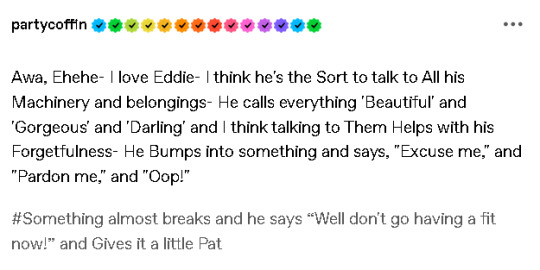
Eddie is also accident-prone, always getting himself into situations (a bug landing on his paper chains, getting chased by Barnaby) and is mainly depicted as the unwilling comedian. Many of his character aspects are depicted as a source of comedy, even by himself. Eddie also has tendencies of prioritizing what others want before himself because of his even-tempered nature. So far, Eddie doesn’t express any serious frustration over this, but with the themes of agency recurring in this story, I’m afraid that it’s going to be a matter of time before we see Eddie express discomfort over this.
Throwback to what I have said: Frank is a smart person who constantly searches for logical answers to things, while Eddie is more laid back and isn’t very focused on finding the right answer and just wanting problems to be handled. This contrast on their personalities and how their backstories are foils of each other (Frank coming from unclear origins, Eddie not knowing the name of the place he’s from) make me think: Is ignorance bliss to Eddie?
Julie Joyful
The sunshine of the neighborhood! The bringer of rainbows in Welcome Home! Julie stays true to her surname, always depicted with a bright smile on her face. She is the one that can turn Frank’s frown upside down. She is the one that can bring a tinge of comedy in Sally’s tragic dramas.
Julie joins the side of the neighborhood that has clear origins. She once lived inside a cave with her siblings, but ultimately leaves under her own volition to find life for herself. Regardless, she is a character that is known for her constant interactions with other neighbors, notably Frank, her best friend.
Her friendship with Frank is extremely special for both of them – if you want to read about it, you should go to Frank's section of this thinkpiece as I've covered most of my thoughts about Frank and Julie's friendship there, but I want to add a few more things.
She is the "funny man" to Frank's "straight man", forming the neighborhood’s comedic duo. She drags him into her shenanigans, like the time they played “Business Woman In The Big City”. They’re also quite competitive when participating in the games that Julie conducts. She brings out the best in Frank, always making sure he feels included and happy in any activity they do. Julie is the “spontaneity” to Frank’s “routinity”. Julie is the “fun” to Frank’s “frown”. They’re inseparable from one another, like Barnaby with Wally.

As stated by Clown, Julie is genderfluid and bisexual. She doesn’t have a love interest set for her, but what’s important is that her character is emphasized with her connections with others. When Frank couldn’t play with her, she plays with Sally and enjoys spending time with her and even stars as the main character in many of the latter’s plays. There are lots of love inside her, after all! She is also said to be quite touchy with her friends, often hugging them and encouraging them to go through with the things they want to do. It doesn’t always have to be seen as “romantic”, like I’ve said before.
Onto her status as a puppet for Playfellow Workshop. Something funny is that Julie has a tendency to go off-script as shown from her interaction with Sally while practicing for a play. She has issues getting into the mood of her plays, making scenes that are supposed to be emotional… comedical, instead.
Is this supposed to symbolize something further? Is this habit of hers pointing towards how she’s going to express her unwillingness to be a mere cog in the big machine? The puppets are very much sentient, but I am not sure if they are aware if their actions in the WHPS episodes are controlled by the script. Time will tell, and perhaps, Julie too.

Home
Finally, we get to the last but one of the most important characters in this story – Home.
Home is the ninth residence of the neighborhood, though it’s not a puppet but a stationery character. It houses Wally, the main character of this story. Unlike the rest of the cast, Home talks in onomatopeias, like creaking its doors or opening its windows to produce sound as means of communication. Its eyes are very expressive and is constantly moving. Unlike other houses in the neighborhood, they’re very expressive.
Their importance isn’t only limited to being Wally’s house or being the only character in Welcome Home that cannot walk or talk.
The mobile characters of Welcome Home never expressed annoyance for Home’s non-verbal trait and instead put in effort to understand them and include them in their activities. They accommodate for Home, making sure they feel comfortable, wanted, and not left out. Home feels… at home around them.
Wally writes for Home to help it communicate and makes his canvas face Home whenever he’s painting, Julie teaches it how to hula hoop, Eddie makes small talk with Home, Barnaby makes jokes and laughs with Home, Frank tries to include home in games of chess, and so on! Home isn’t just a building like the rest of the cast’s houses. They are part of the family. It makes me so happy to see that their existence isn’t considered a burden or an annoyance or have their traits be seen as sources of comedy. It hits close to home for me as a physically disabled person.

Regarding the overarching story outside of WHPS, Home is a character that plays a significant part in Wally's journey. Wally loves Home dearly. He takes care of Home and makes sure he is in great condition. He is the caretaker for Home and becomes its communicator when the situation calls for it. In return, Home makes sure Wally is safe and sound inside their cavity and expresses their love for Wally through communication from creaking noises and even lightly squishing him between their door and door frame. Home is also quick to notice changes in Wally’s behavior and shows their concern for him, signifying just how deep their relationship is.
As I’ve mentioned many times before, their closeness cannot be boxed into the usual types of love humans are used to. You just know they are extremely linked to one another and that their relationship is not only important in WHPS, but also the story as a whole.
Home and Wally are inseparable from one another. They have their separate personalities and are distinguishable from one another, but ultimately they will always be one. Home is Wally’s fortress. Home is the shield to Wally’s sword. Home is the pericardium to Wally’s heart. After all, “Home is where the heart is”, right?
Afterwords
Yay! Whew! Congrats on making it to the afterwords! I’ve spent more than a week writing this whole thing and having my friend @rxveriecaeli proofread this thinkpiece (Morfe if you’re reading this I love you bestie). Huge HUGE shoutout to them because I’d be lost without them giving the finishing touches!
I know, some people will say that I’m reaching or thinking too much about this story, but hey! That’s why it’s called a thinkpiece and not a theory or concrete proof of X or Y. I cannot say that I’m 100% sure about where the story is heading or what Clown has in mind for certain characters, but I just want to think and love making connections and my brain just keeps producing questions after questions after questions. Are the feelings they have with each other theirs and not the byproduct of the script commanding them? I believe so.
What if Poppy is a flightless bird because she's based on Big Bird and not because it's an analogy for her not being able to fly freely away? What if Howdy is an adult caterpillar because he just IS and not because it's an analogy for not being able to turn into a butterfly that can fly? These options might be so, but even if Clown someday confirm that their design choices are simply because they're inspired by other puppet characters, I'm just happy that I manage to find symbolism that I can connect to their character designs.
I think it's too early to assume that the puppets are surely seeking freedom. At most, they just want to be saved from the tragic states they’re in, and Wally is on the lead. I mean, the show's canceled and they no longer live by following the scripts made for them! We don't even know the true fates of them aside from being nearly forgotten to time. And even if the puppets do achieve freedom, what will be of them? The producers aren't around anymore, the employees that treat them as toys but also take care of them aren't there anymore, and they have to fend for themselves in the big world.
I am not a native English speaker and I cannot put some of my thoughts into words both because of my language barrier and my ADHD. I do not intend on expressing malicious or harmful subtext through this writing, but do tell me if I had worded anything incorrectly and I will fix it. I would love to hear your thoughts about this thinkpiece too, so don’t hesitate to leave comments or tags in the reblogs (though please be patient with me!). Not that I will tolerate hateful or bigoted comments, however!
Please do not start accusing me of spreading the rhetoric that “being queer/neurodivergent is painful and constantly suffering and if you don’t suffer you are not part of those groups”! Being queer is fun and liberating. Being neurodivergent or disabled is something to take pride in. I’m proud of who I am and I encourage others to be so too. The experiences of queer/neurodivergent won’t always be easy, though, and I made this analysis and the correlating connections based on my own experience as a queer, autistic, and physically disabled person.
That being said, thank you for reading!
Fun little trivia! The characters' favorite colors form a rainbow when put in respective order, just like the colors of the original pride flag :]

#LONG POST AHEAD!!!#welcome home#welcome home puppet show#wally darling#sally starlet#frank frankly#poppy partridge#howdy pillar#barnaby b beagle#eddie dear#julie joyful#home#senja writing
223 notes
·
View notes
Note
Regarding your revised Eden!Culrpit Theory Post:
If you're okay answering this, why do you believe that people who believe Hu is the culrpit have to be reading her actions in bad faith? You said that Eden taking the tape means there's more physical evidence for her being the culrpit so arguments about her putting on a facade come from less of a place of bad faith.
However, Hu's wire is involved with the crime & there's no explanation for how it got there. 'Nico took it' but we don't necessarily know that or how, so there's arguably no less reason to assume Hu could be involved as well.
This isn't meant to be inflammatory either, I genuinely just want to understand what you meant by that; I'm impartial one way or another but I don't understand why you would need to be reading Hu's actions in bad faith while you wouldn't also be doing the same for Eden.
ty for answering if you do, and if not ty for reading anyway. ♥️
Hey! Yeah, honestly, I feel I expressed myself pretty poorly in that section of the post you’re referencing, in fact I’ve decided to edit it because I believe it came off as more aggressive and meaner than I intended it to. So it’s fair of you to ask for clarification.
CW: Eden!Culprit, discussion of murder attempt
Technically speaking, both theories revolving around Hu trying to kill someone and Eden!Culprit require some level of “bad faith reading”, in the sense that suspecting anyone of murder is going to make you look at most of what they say in a negative light. So I was wrong to use that term with Hu. I think a more accurate way of saying how I feel about it (and keep in mind this is just my opinion) is that “the level of scrutiny Hu and her lines are placed under is not justified by the concrete evidence of the case(s).”
That should make my feelings a bit clearer. I see the tape’s disappearance from the gym as near irrefutable evidence that Eden is the culprit, so I’m willing to bend and twist her lines of dialogue to fit the evidence. Dialogue has an openness of interpretation that the tape, in my opinion, doesn’t, though I get why that’s not how everyone feels about it.
However, I don’t quite see an equivalent for Hu. The wire in the Ace crime scene doesn’t incriminate her any more than the turpentine used incriminates Rose, or the letter written to Arei (by itself) incriminates Eden. I can pretty confidently say that either Ace or Eden took the tape from the gym; I cannot confidently say that Hu took the wire to the gym.
Despite Nico being caught mid-murder attempt (and they admit they did try to kill Ace), Hu is nowhere to be seen; none of her dialogue afterwards implies she was there; none of Nico’s dialogue points to her being there (their secret quote doesn’t count, we don’t know if that’s gonna be said this chapter or not); unless there’s some method theory I’m missing here, I’ve never really seen a method that requires Hu to be there alongside Nico, and Nico never denies being the one to take the turpentine, meaning they must have been involved since the start. You get the idea.
You need to somehow get around all of that if you’re going to believe Hu is involved in the Ace case, plus the fact that a lot of her dialogue seemingly contradicts the notion at first glance. Meanwhile, the only assumption Nico!SoloAceAttacker requires is that Nico, somehow someway, was able to take the wire at some point; and given there’s precedent to believe they can and would do something like that (turpentine), I find it quite easy to believe.
Obviously, it’s a matter of opinion. To some people, the wire is a smoking gun that proves Hu’s involvement, the same way I feel about the tape for Eden. And I guess, in that case, I can’t really blame them for reading Hu’s dialogue in a different manner. For me, though, the wire has perfectly acceptable workarounds. And I feel Hu being involved in either crime scene makes far more assumptions than simply saying Nico did everything themselves, which then by Occam’s Razor makes me inclined to believe the latter.
Thanks for the ask, and sorry if anyone felt hurt or offended by my original wording, it really wasn’t my intention.
22 notes
·
View notes
Note
Hi! The Zukaang prophecy dream person here. What you said about a lot of people not even considering Aang and Zuko as a ship made me think. Following that thought, I fell down a rabbit hole that turned into something a lot deeper than just shipping discourse. I'm not a professional psychologist or anything, but I hope some of my insight on this topic is interesting. I apologise in advance for so many words to read!
As a kid I remember being very clueless about romance. I never really interpreted Aang's affection towards Katara as romantic at all, and I honestly have no idea why, since they literally kissed on screen multiple times. So that's why, for years, I remember trying to find a ship that I would like, yet nothing seemed to click just right. That is until the Avatar Renaissance of 2020 when a lot of new people joined the fandom, and a flood of new discussions arose, way different than it used to be years ago. It made me realize that the core of the issue lies in Aang himself. At least that's my own theory, feel free to disagree. A lot of popular avatar ships include everyone from the main cast, but rarely ever Aang himself, apart from the canon Kataang. In all aspects, Aang is an unconventional protagonist, one unheard of at the time. He is a monk, he is a pacifist, he is a vegetarian. For an average kid or teenager in 2005, I don't think much of these aspects are too relatable. We were and still are used to seeing agressive, determined teenage protagonists, ready to beat up the bad guy at any opportunity. That's what was considered "cool". So a bald 12 year old boy with an arrow on his head who grew up in a temple, surrounded by monks, who avoids hurting people, even those who wiped out his entire nation, is simply foreign. You often hear arguments against Kataang: he is too young for her, she sees him as a little brother, they simply don't fit. Those are all false statements, as rewatching the show without bias you can clearly see them love each other deeply and mutually. Aang is a child, but he is a person too, someone with his own values and principles, and so is Katara. To me, both of them are deserving of love, Aang is deserving of Katara's love.
I am now going to talk about the genocide of the air nomads, as I think I can provide a unique perspective on this. I am Ukrainian. The russian invasion of my country has been going for 10 years now, but two years ago specifically my whole world turned upside down when russia launched a full scale invasion, intending to conquer all of Ukraine. A lot of my beliefs of how the world worked changed drastically. Seeing myself from years ago in people from around the world, not yet knowing war, I think this is something you have to experience yourself to truly understand what it means for another nation to want yours erased from existence. Aang's entire nation is gone. Everyone. No one is alive, not a single person. I don't think many people truly let that sink in. He has to keep going every day with the knowledge that the world he is in doesn't have a place for his nation anymore. He has nowhere to go and no one to come to. He has the gaang, and that's wonderful, but it's not the same. He is the only person in the entire world who truly bears this pain. To me, imagining that for myself, is an indescribable horror. To imagine having no place to come back to, living among strangers who know nothing of you and your people. Yes, he has the temples that preseve history, but how much of them has been destroyed? Even the people at the Northern air temple, although fleeing a disaster, still contributed to the destruction and loss of that history.
Yet, bearing this unimaginative hurt, Aang is able to forgive. He is able to make peace with his loss, and let go of his feelings of rage. He wants to see good in the Fire nation people. And through that, he is the only one who can truly see Zuko as he is. Having let go of anger and hurt, he can see the genuine wish Zuko has for atoning for his family's sins. He can literally see through him, all his feelings and thoughts, like no one else. He holds no grudge, no hatered for him. If you ever have a war, genocide unleashed on your country, you would know how impossible it is to forgive. Yet, Aang, as the avatar, has no choice but to do just that, to let go. I think that alone makes Aang one of the strongest people in the avatar universe.
But how is this relevant to the Aang ships being dismissed? Circling back, to me, this is a matter of understanding. People resonate with Katara for her experience as a younger sister, thrown into the role of a mother figure, for her experience as a teenage girl in a sexist world, someone with a desire to become stronger despite being denied that opportunity, be it by the circumstances or by someone stronger than her deeming her "unworthy". People resonate with Sokka for his struggle to become a reliable leader, for his insecurity being the only one without a special "talent" (aka bending). Toph for her sheltered upbringing and parents that are unwilling to see her as more than just her disability. Zuko for his struggle with his identity, his own values versus those forced upon him, an abusive household, repressed emotions and anger, being a sibling of someone way more naturally talented, coming to terms with the hurt he has caused and atoning for it. But what can people find in Aang that resonates with them? All of what Aang is, is grand and bigger than yourself. I relate to Aang as someone whose nation is being subjected to genocide, but is that a common experience? I'm sure that nowadays a lot more people came to appreciate Aang's character more, but as a child in the 2000s, would you really say you saw yourself in Aang as much as you saw yourself in Sokka, Katara, Toph or Zuko?
In conclusion, my theory is that, because of how unique Aang has been written, that prevents people from seeing him as someone they could imagine in a relationship with someone else. After all, how can you write about someone you don't share many life experiences with? How do you write them in love? How do you make someone so different from you come to life?
Anyway, thanks a lot for reading all of my brain vomit. Avatar is truly a goldmine for character analysis and study. Would really love to hear what you think!
I absolutely loved reading your analysis on Aang's character, anon. I agree wholeheartedly with everything you've brought up here. I think it's so true that many people (whether they're conscious of it or not) view Aang through a certain lens due to how unconventional of a protagonist and person he is. To many, he's not "supposed" to be the one who "gets the girl". He's not your stereotypical handsome/buff/rugged teenage boy protagonist; he's small, kind, goofy, and pacifistic. And I think in general that people find it difficult to wrap their heads around a male character like Aang not conforming to Western and/or patriarchal society's expectations/conventions when it comes to behavior and overall physical appearance. I think this also results in a lot of people unconsciously infantilizing Aang and having a hard time viewing him in a shippable way.
It's also interesting that you brought up Aang's almost "otherness" when it comes to the world he finds himself in when he awakens from the iceberg - he is the last one of his kind in a world where nobody remembers his people. He's from a culture that is vastly different from the ones that remain in the world. His philosophy, mannerisms, gender expression, appearance, etc. are all completely unique, not only canonically in the post-genocide AtLA world, but in our world as well, especially in the West.
The fact that despite everything Aang has been through, despite all the atrocities he has witnessed, he still is able to remain true to himself at his core through to the very end is so moving to me. Aang will always be my favorite character all time simply because of who he is. Even as a kid, I loved him so much - I never had a crush on Zuko or Sokka, it was always Aang. He represented not only the type of person I would want to be, but also the type of person I would want to be with. And sure, he's not perfect, but that's another one of the many things I love about him - he's human, he makes mistakes.
I feel like I could say more, but you already wrote so much good stuff in your analysis, and I'm not sure if there's much I could add haha.
Also, thank you for sharing your perspective as someone who lives in Ukraine - I can't imagine how difficult it must be to be dealing with all of Russia's BS the past decade, and especially recently. I sincerely hope you're staying safe and healthy! <3
34 notes
·
View notes
Text
The Untold Origin's Angel Play analysis and why Natsume is Fyodor's Judas (or something like that)
I don't know how much sense this will make, but the play always made me curious and I've been wondering if it might have a connection to future and past events, so here are some ideas. Also, please ignore my wonderful screenshots's quality.
Credit to my friend @keygalley because it was from her that I got the theory that Natsume is "that man".
The play opens with twelve fallen angels (one of them already dead) speculating that they are about to be killed by true angels from heaven. They also speculate that the killer might not be an angel, but one of them.

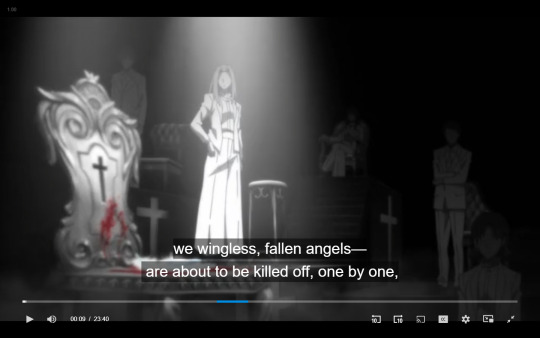
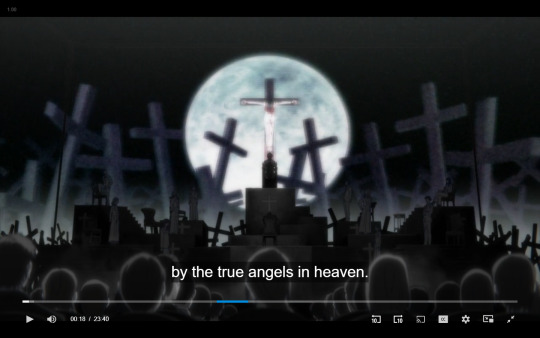

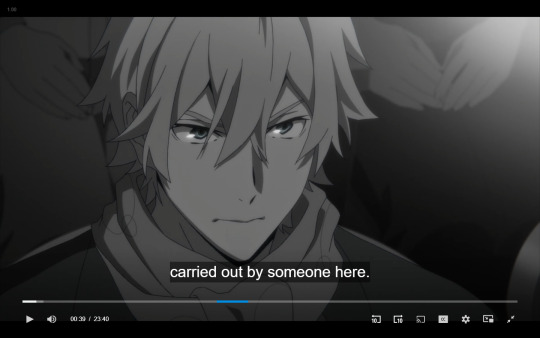
The middle chair is covered in blood. You could say that a murder has already occurred and it's the one that started this whole discussion of the angels from heaven coming after them in the first place.
The fallen angel who is their leader believes that the punishment is because they fell for adoring humanity, and so they must be purged.
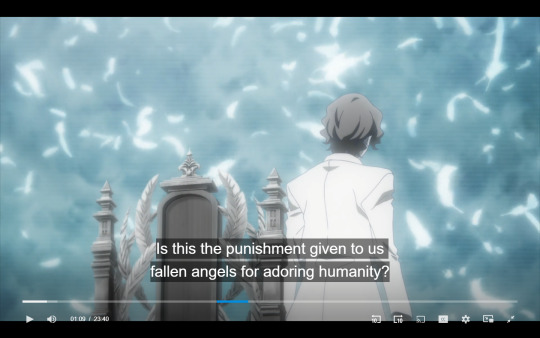
The leader refers to the angels from heven as "gifted," another way of referring to ability users. Fukuzawa himself later calls Rampo this way.
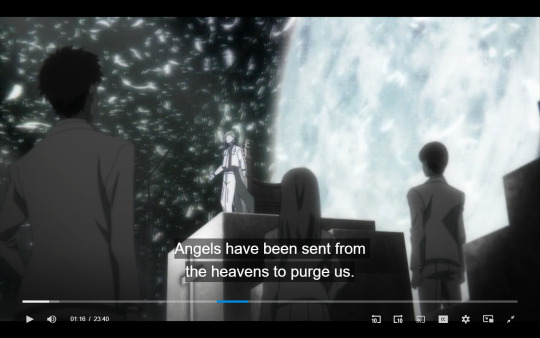
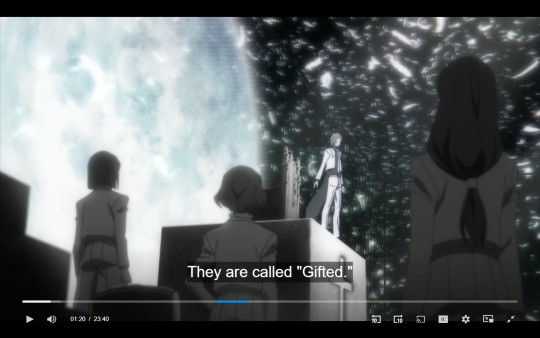
The fallen angels are now mere humans. They dream, they love, they seek fulfillment because their existence is limited. Here I feel this could relate to Fyodor, not because he shares these characteristics, but because he lacks them because here he would represent an angel. For him nothing exists but his mission, that is why he is capable of the greatest atrocities.

Also, in this speech it is said "And we do not regret that decision. To choose one's own way of being is the truest form of the soul". Several theories have already been seen about characters being nothing more than that: characters in a work of fiction struggling against a predetermined destiny. Later it will be seen that there is a similar view on this subject.
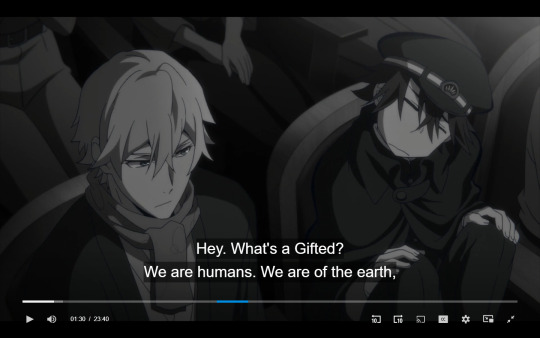

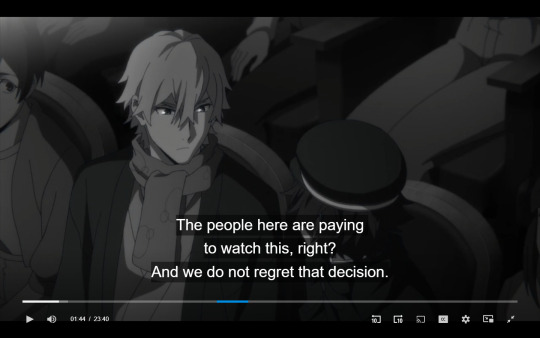

Rampo saying "Why doesn't anyone get upset at being forced to sit through a show with such an obvious ending" could have double meaning as the author questioning why we, his audience, are watching BSD in the first place. Basically metafiction, something that is a constant in this play.
If Ranpo points to a random fallen angel as the murderer it is because it is true; that man was the one who committed the first murder that triggers the whole conversation. It is later revealed that the murders were committed among the fallen angels themselves.

“Angels cannot have the fulfillment which is the realm of humanity, and humans are incapable of the supremacy of angels. Those who control humans from the outside and those who enjoy fulfillment on the inside are like an author and their character: never shall they intertwine”. Funny thing to say, because angels and humans do end up intertwining. There are humans who possess angels' powers, in other words, the abilities as we will see later with the phrase: "There are those who, despite being human, have some fragment of angels’ forbidden supremacy". So, if such a comparison is given later in the next paragraph… don't the author and the characters end up intertwining as well? Metafiction, again.
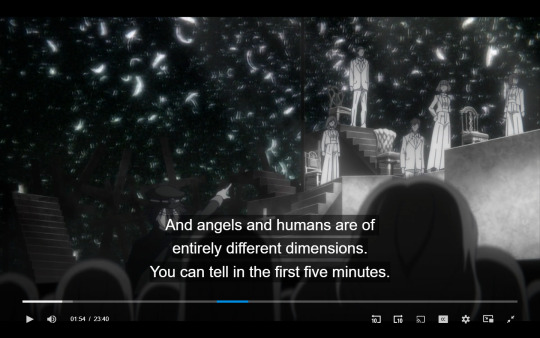

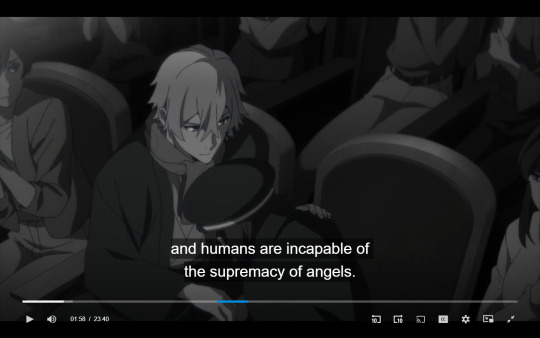
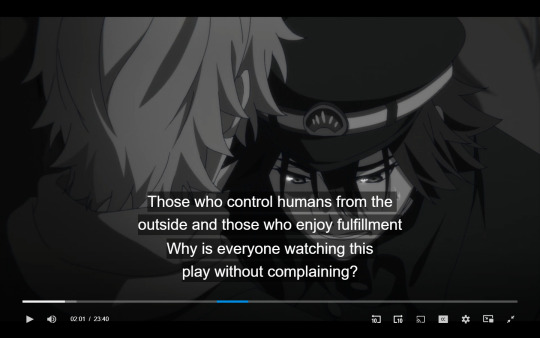
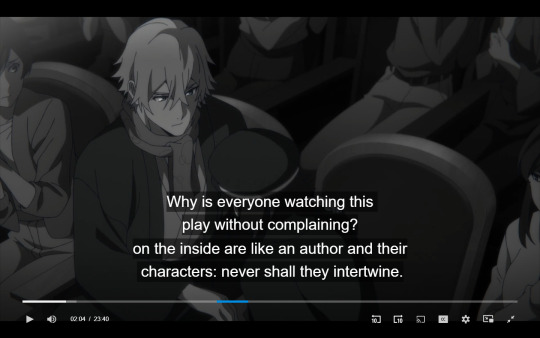
Remember that scene where Nikolai gives his speech about freedom and there is someone writing down his words (maybe in The Book)?
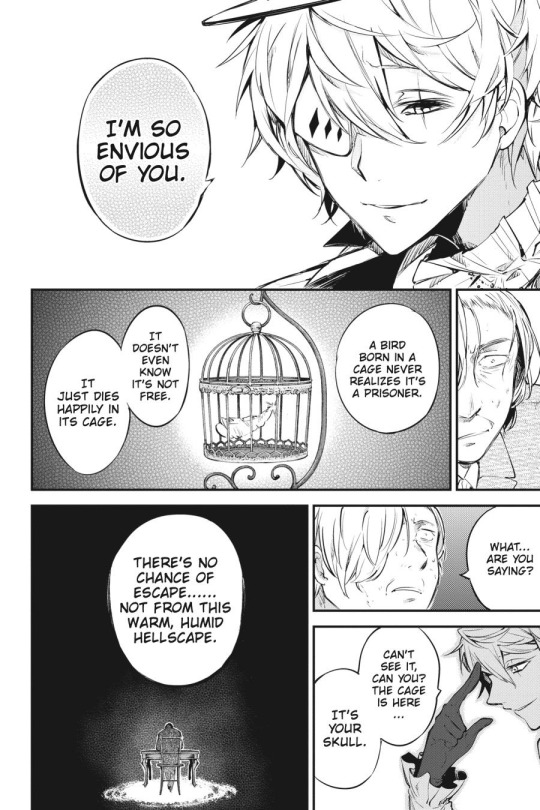

To go against the destiny written by the author, who is your God, is not to be conscious of it and therefore to have these two separate realities intermingle? Is it not, in its very essence, a rebellion against God like that of the fallen angels? Which reminds me of Fyodor's quote about Nikolai:

That the angels then say "And yet... And yet?" seems like a joke.
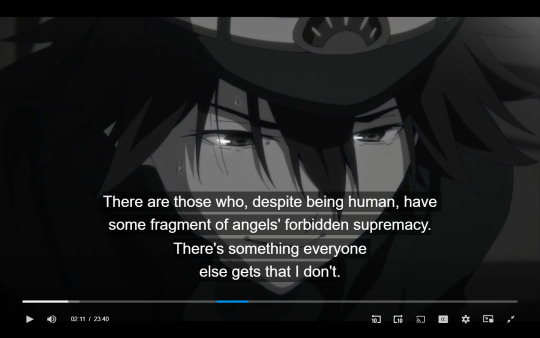
“Why is everyone watching this play without complaining?” again, metafiction (I'm tired of saying this).
Now, the Leader asks a specific angel to appear before the humans. The Leader knows what this angel wants, so it seems that the angel might have something specific against him.
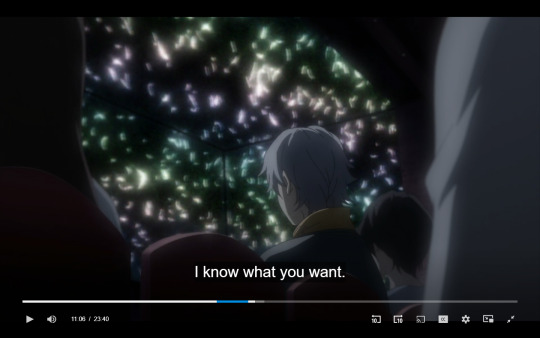
It could be interpreted that of the 12 initial angels, only one remains: the leader, who was condemned to see how his friends eliminate each other thanks to their new quality of being human.
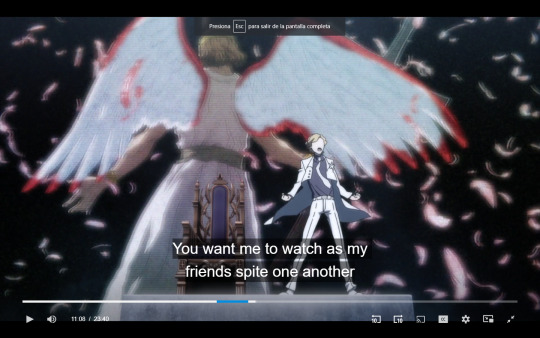
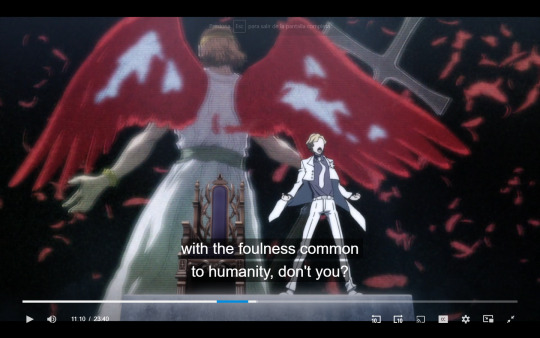
What does the leader wish to expose about the angel? What sins did this angel commit? Before he could say more, the leader dies.
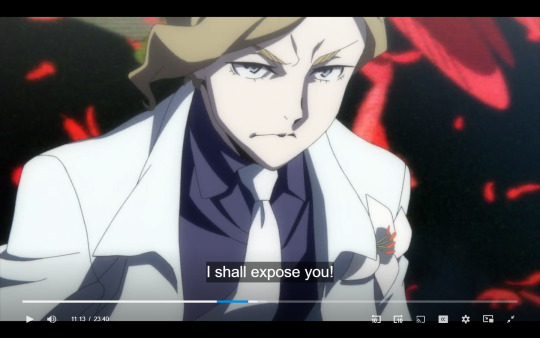
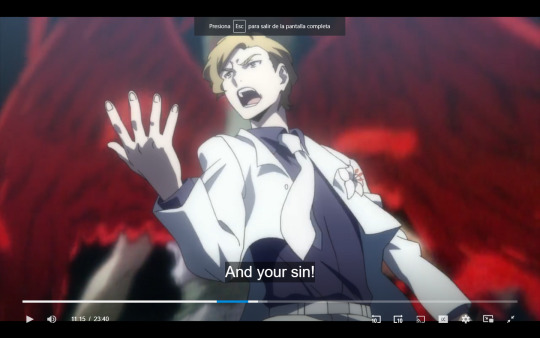
After all this interpretation, what do Natsume and Fyodor have to do with all this? Their roles in BSD could be represented in the play:
The angel is Fyodor. The murders that occur are between the same fallen angels who betray each other (hello? arc of cannibalism?). This could be one of Fyodor's many strategies to accomplish his goal: to purge the fallen angels who betrayed God. But he tortures the leader in a special way and forces him to watch his friends kill each other, as if he has some special resentment towards the leader, that is, towards Natsume.
The leader is Natsume, for whom this whole work was written. And he might know Fyodor's secrets that could be considered his sins.
Fyodor has talked about only "that man" being able to hurt him, besides now Dazai, and Natsume is referred to as "that man" to my knowledge for two times: in this image and multiple times by Oda in Dark Era.
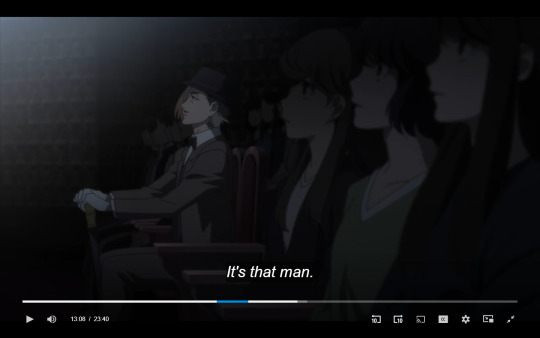
Rampo says that angels do exist. That angels exist and it is the audience could again be metafiction. In anime it is metafiction, but it could go further as the audience is on a higher plane to the characters, but below God, the author.
This is a reversal story is something that confuses me because it could apply to both the play and the murder. In the murder the roles are reversed because Murakami is not the victim, he is the murderer, and Natsume is not the murderer, he is the victim. Is it just because of this that it is a reversal play or is there more to it? My possible theories about other inversions that the play could represent:
In the past Fyodor lost to Natsume. In the play the angel, Fyodor, kills the only fallen angel left to punish, Natsume.
At the end of the play, the roles are reversed: the angel ceases to be Fyodor to be Natsume and the leader ceases to be Natsume to be Fyodor. In the play, the leader dies, but fakes his own death as Fyodor might do in the future (copium). Also at the end, the leader is referred to as a fallen one, could Fyodor be nothing more than a fallen angel trying to redeem himself by hunting down other traitors to punish them? Something like "crime and punishment are two sides of the same coin".
Now, what Murakami says at the end, could it be Fyodor's realization about his mistakes in a future? As if all his killing really wasn't justified, wasn't for ridding the world of sin, but for selfish motives. And if in the end he looks at everything he has done and looks at the audience, at us, he will discover that in the story his role was not one of a savior, but one of a villain.

And my most bizarre opinion: the characters are an angel who is mentioned and twelve fallen angels. The angel seems to have something against one of the angels in specific: the leader. The angel is Fyodor and the leader is Natsume. Fyodor has been compared to Jesus, the twelve fallen angels are his apostles and the last fallen angel is the man with whom he has a special grudge: Natsume, his Judas.
Now there's only one thing left… what's up with the crucified man at the beginning? Something to note is that while everyone is speculating about the murders, the leader who represents Natsume is observing the crucified man which doesn't necessarily mean that Fyodor was once crucified... but could mean that Natsume is the one to blame for Fyodor's "crucifixion" and that's why Fyodor is resentful with Natsume. Could this be related to exposing the alleged sins of the angel?
Natsume betraying Fyodor in some way could explain why he doesn't trust anyone.
Cat and mouse
I could imagine this whole play as a message from Fyodor to Natsume.
Edit because I added more things to think about:
We don't know why "V" wanted to kidnap Natsume, but we do know they used this play to do so. If we assume that Fyodor belongs to this organization (or used them), then it could mean that he wanted to kidnap Natsume. Also, Murakami said: "The gentleman in the suit rarely appears in public. Apparently, capturing him was one of the objectives." Why did Natsume risk himself to watch this play? Was there something in the plot that caught his attention? Perhaps the plot in this play was known to both Fyodor and him because it was their story.
I never mentioned the play's title because I don't know what to say about it. The name is "The Day is a Dream, the Night is Real". It's the play's name therefore it has to be important but... why? Yes, like in the play, a crime that was only fiction became a reality, but... that's all?
#does this make sense?#at some point i hit tumblr's images limit *cries*#i confess i was trying to write a natsume x fyodor fic and i ended up doing an analysis of them lol#bsd#bsd analysis#bungou stray dogs#fyodor#bsd fyodor#fyodor dostoevsky#bsd natsume#natsume soseki#soseki natsume#nikolai#bsd nikolai#nikolai gogol#rampo#bsd rampo#rampo edogawa#murakami
27 notes
·
View notes
Text
Points of interest from today's Pix stream
See behind the cut for some points of interest transcribed from Pix's Empires stream today (fWhip joins in, in chat, too). Included:
endings for the season and fan expectations
fanworks and headcanons, how Pix wanted to structure his S2 to enable fans to run with their own ideas, and how his S1 ending the way it did also enabled that
what Pix would like to do if there's an Empires S3 [speculative only; not concrete plans]
Behind the cut with you!
This led out of a conversation wherein Pix discussed having seen many fans' opinions of S2 ending 'suddenly'/'too soon' and 'unsatisfactorily' and not to their liking, and how the endings could have been better/loose ends tied up more, etc etc (we've probably all seen those opinions and posts repeatedly by now, so I'm not going to belabour them anymore).
First off, Pix very briefly mentions his season end plans:
fWhip (in chat):
A lot of people seem to have taken my video as the end.. not realizing everyone will upload their own finale. I didn't do any real lore this season so having a full lore based ending felt wrong
Pix:
I've got an ending planned, but it's going to be very much like my ending. And, again, I'm somebody who doesn't have any story to my stuff, really. Like… I became a ghost. Nothing's really happening with that. It's just a fact of my existence now.
fWhip (in chat):
I finished building gobland to where I was happy with it, so that was a natural end for me as a creator
Pix:
Yeah, like, "Guess what? I'm done building. Series over!" [pause, then mutters] I wish I was done building [laughs]
[discussion continues for a while around fan expectations]
fWhip (in chat):
also I think some fans don't realize not all of our audiences love the heavy lore, and if our videos don't get views we can't really keep making videos lol
Pix:
Yeah, that's the thing. There's always going to be the most activity around stuff that people really feel like they can get behind as a community. But the communities tend to isolate themselves with other people who enjoy the same stuff they do, right? So, like, folks on Tumblr or Reddit, for example, might get really behind certain creators' approach to lore.
[short discussion about browsing the Empires subreddit and seeing so many posts about Jimmy being a toy, including polls worded in such a way that they're biased from the outset. also how - when fans latch on to certain ideas like that - it can be stifling to a creator, as in 'once you've exhausted that thing but people still want it from you, where do you go from there?']
This next part was what I really loved about this stream discussion: Pix's views on fanworks:
Viewer:
Tumblr will come up with lore even if there isn't any tbh
Pix:
And that's what I wanted to do with this season. I really wanted to just create whatever I wanted to create, and have it be something that people could speculate about all they wanted to, and any answer would be the right answer. That's one of the things I liked about… [pause] Even though I felt bad having left Empires Season One when I did, and everyone else was very kind in pointing out, like, "You said you were going to leave then anyway, so it's not you kind of left us in the lurch, or whatever"… [pause]
One of the things about the ending of Season One not really being there was that people come up with their own theories about what happens to the Copper King after all of that. And I'm, like, "All of those are correct!" [laughs]. Whatever you think happened, happened. Because that's the fun of using your imagination for stuff like this, right? That's sort of the approach I want to encourage people taking when we do projects like this, is your interpretation is just as valid as ours. And if you want to imagine that stuff, don't always expect us to act on it.
Finally, someone in chat asks what Pix would like to do if Empires S3 takes place. [NOTE: This should not be taken as gospel and what Pix plans to do. He appeared to just be spitballing and chatting casually here, so this isn't a concrete plan, nor is it confirmation that there will be a season 3. I'm just adding this as another point of interest from the stream.]
Viewer:
I know you said that you're not sure about Empires season 3 but what would you do if it did happen?
Pix:
That's the thing: I really don't know, and that's part of the reason we're not doing a season 3 immediately, if at all. I don't know what ideas would work, I don't know what ideas would be compatible with other people's ideas.
Like, I would love to do something that feels a bit more modern, because I don't challenge myself often enough to build in a modern style. I would love to do something that felt a little bit more cyberpunk, in… like a System Shock kind of way. But I don't know for certain if that would be at all compatible with anything else, because Empires in general skews a bit more, like, D&D fantasy, which tends to be more medieval fantasy; European medieval, specifically.
And, y'know, there's a few exceptions to that, but I think a lot of the time - because Minecraft itself feels like more of a fantasy world… y'know, there's cobblestone and wood everywhere, and bookshelves, and enchantment setups, and brewing and that kind of thing. It all feels a lot more medieval fantasy than anything else. I just think it's kind of difficult to sell the idea of there being, like, a cyberpunk kind of modern setup in the middle of all these other people who are still playing, like, straight-up D&D. It feels anachronistic, and not in a good way.
[brief discussion about how 'modern empires' could also mean business empires, but that would then mean creators having to build whole cities, which are a pretty hefty undertaking]
130 notes
·
View notes
Note
LCSYS ask again(undercover asker here hiiiiiaufhghghgn)thank you for responding!!!! ilovfe seeing your ideas theyre such good fuel in between trials❤️❤️
i was wondering how th prisoners would react to es’ usage of violence, like some of the younger prisoners complaining about it while the older are concerned because Hello Where did that stem from???? you cant tell me es’ “phew, i feel so much better” after hitting shidou didn’t send his mind racing a million miles per minute
ALSO curious about YONAH………… similar to how red’s violence towards es was scripted, was kotoko’s monologue about es being imperfect Also scripted, or was it on her own? yonah is probably my favourite voice drama of all time and I’m curious about how it would be interpreted in this au 🫶
Ah hello again! Thank you so much for reaching out -- every time I think I've covered everything you guys hit me with a new insane detail that makes my brain go brrrrr >:3
Because OMG I spent so much time thinking of the faked violence, I don't know why I never put as much attention on the flipside! I love the idea of Jackalope assuring them, "there will be no physical punishments. We'll talk about restraints but that's all fake. We'll make up injuries between trials but that's all fake. You don't have to worry about any real pain." And then this 15yo strolls up, interrogation one, ready to smack someone😅😅😅
Seriously though, I think it would come as a pretty big surprise to the group. They knew it was a possibility, but didn't think Es was that likely to attack, since they've made a few comments about being against violent punishments. Haruka comes back to mention the slap, and Yuno follows their instructions and says she also suffered violence, and the group is Shocked. I think it would just kill Fuuta that he wasn't allowed to hit back and avenge the others. He probably has the most complaints about the situation (and is insanely relieved that he get by in his own interrogation.) In a feeble attempt to get back at Es and make them feel bad, he encourages Muu to cry and make a big show about being afraid of them. Muu is frightened enough that it doesn't take much persuasion... I think Kotoko and unfortunately Amane wouldn't mind the threat, they both have lives in which authority showing power isn't out of place (and maybe Haruka?). Mahiru, too, thinks it's just the way a prison guard can run their prison if they want, though she's determined her charm will keep things running pleasantly.
Kazui reaches out asap* to question the legality of the experiment, since they're allowing children to get hit, even if by other children. There's a tangle of signatures and consent from everyone involved so it's okay, but the whole thing still rubs him the wrong way. He knew the experiment was a bit shady, but he(Though, this does make his first vd kind of funny -- instead of actually talking through his theories on the prison, now it feels like he's just egging Es on to see if they'll actually hit him...)
And I really like that idea that Shidou's dad instincts kick in (or maybe it's doctor instincts)! He'd understand if it was a child trying to play the role of an intimidating adult, but the way Es is doing things, the things they're saying, it all points to something deeper going on in Es' head. I can see him sitting down with the others and Jackalope to discuss. Of course Milgram gives him very little to work with, but this still kickstarts everyone's efforts to make sure Es is also taken care of post-Milgram.
*I just realized I'm still a bit fuzzy on communication during the trials. Jackalope can definitely get information to the prisoners (most commonly the 'voices' they're supposed to be hearing based on Es' notes, but also in case of emergency changes or things). I was picturing the prisoners unable to communicate outward until the trial ends, as it builds up the feeling of isolation and imprisonment. The issue is, I feel like Jackalope would want to keep that line open in case the prisoners had questions/issues with the experiment that affected their acting. So idk if the prisoners voice these concerns about Es mid-trial or they're forced to wait. I'll get back to you on that, hm
And Yonah!!
I wasn't avoiding spoilers, I actively looked for snippets here and there, but it was this ask that finally motivated me to sit down and watch it through -- and I'm SO GLAD I DID 👀 It's really well-written and wonderfully acted!! I'm floored with the whole thing omg
I really like the idea that the Milgram team instructed Kotoko to mention Es' imperfection to rattle them a bit, but left the specifics to her. Jackalope thought she'd just make some quick comment, and does a double take when he listens in on the interrogation and realizes she has a lot to say on Es and the way Milgram is run.
Jacklope told her to be harsh with Es, and she thought that was no problem at all. She felt those opinions strongly and wasn't going to go easy on the criticism just because they were a kid. She goes into the interrogation ready to stay completely put-together... and then surprises everyone and herself when Es' distress moves her to pull them into a tight hug and tell them everything's going to be alright ;---;
#milgram#es#ill have to peek back through the material but i definitely remember es saying they dont have to worry about violence#and also openly condemning kotoko and other violent reactions#so the sudden switch would get their gears turning 👀#operation 'save es from whatever crap is going on' begins as early as t1#more in line with canon than the au but capri had a thorough post about es' attacks and stuff with physical touch -- maybe i go peek at tha#i think theres more angst if the prisoners cant communicate with Anyone during the trials -- theyre completely sealed off#but i feel like it may cause more problems than its worth... but if its just a story i can just write those logistic problems away lol...#thank you for the ask!! i also need fuel between such long breaks of content so it makes me so happy to chat about this :D#and i appreciate the little nudge to watch yonah -- i can def see why its your favorite omg#that last moment i mentioned is SO important to me -- it reveals a huge part of kotoko that i think even she doesnt fully realize ;-;#tw child abuse#yonah spoilers#lights camera sing your sins
31 notes
·
View notes
Note
Whatever you do, don’t read “The Old Astronomer to His Pupil,” by Sarah Williams and think about Tony and Peter.
The last line destroyed me 😭
firstly, the title makes me think of my hc ( that has worked its way into a few of my fics) that tony loves to examine space the way he examines a bunch of wires, looking at it like something to solve but one he cannot reach. The onlymachine out of his grasp.
I like the idea that he has a setting in some of his teched-out glasses which highlights all those astrological sights that he can’t see as a result of light pollution. that he likes being able to see through the haze of everyone else living. He can have his people and have the stars at the same time.
And, for the poem!
I know this poem may read as an irondad one to some. But, once i read the start of it, i was thinking of my theories for the next Spider Man movie. that it’s a post-NWH poem. The idea of the astronomer warning the pupil that they will scorn him, that people will not believe their work regardless of its certainty, seems to come from a place of discredited expertise. It doesn’t read like something associated with The Great Tony Stark, because everyone believes him. People wouldn’t mock his work.
But Peter? peter post NEH? Nobody wouldn’t believe him, because he IS nobody. I imagine him saying this to a new friend he makes, maybe someone who discovers that he is spider man and Peter has to convince them that he knows what he’s doing without revealing his whole story.
I like the idea of peter making a friend who is just as lonely as him, and this is reflected in the line in which the astronomer discusses the pupil saying that the pupil “has none but [the astronomer]”. A friendship in which peter is nobody and his friend has nobody. And peter has learned so much, SO much, about heroics and sacrifice and secrets and their weight. but the apprentice still is wide eyed and hopeful, wishing th save the world but forgetting what happens after they do.
The last stanza reads to me like the astronomer has died. But, if i continue my theme of interpreting it as lost-NWH peter, i think of it as growing up. his vision has faded. he no longer sees all the horrid things happening on earth because he is so used to them. God will mercifully guide him on his way amongst the stars, because he went to space against everyone’s wishes and yet he survived. He was guided back.
Good poem. Very good. If anyone wants, i’m happy to also try to see it through a tony and howard lens. or, even, pepper and morgan. just send an ask
15 notes
·
View notes
Text
I watched Lain over the past two weeks. Twice.
The first time I saw it I didn't have a clue in heck as to what was going on, but I had a pretty strong feeling of what the show was saying. The second time I understood all of the secrets of Lain and am here to preach her gospel. Haha, just kidding. But I do feel strongly that of all the possible interpretations, the literal canonical one is the only one I've heard that isn't satisfactory.
In addition to all the crazy theories I've seen people come up with (Lain is Jesus, Lain is Shinji from Evangelion, all of Lain is about aliens, etc.) - and god bless the lovely people who write those - there are two common interpretations. #1 is that Lain is a program constructed to break down the barrier between the Wired and the real world. #2 is that Lain is schizophrenic and by the end of the series has gone completely nucking futs. You can think of these as the literal interpretation and the meme interpretation, maybe.
My problem with #1 is if you accept it, the finale is deeply troubling. One key theme in Lain is that Lain despises being observed, but she loves observing others. Notice how panicked she gets any time the Men in Black train their sights on her in the early episodes, or the repeated scenes of her family members opening her door to stare at her, say nothing, and leave. And this gets discussed explicitly in the finale, where Lain tells herself that maybe she prefers to be a god because it's easier to be a god than a human being - you don't have to be seen but you can see everything. It's very clear that the point being made here is that Lain, if given the choice, would choose to be human after all she's been through. As such, her decision to remove herself from the world feels like a defeat, a hollow tragedy, and a betrayal of her own arc. It's not bad writing, necessarily - it just feels bad.
#2, by comparison, sits okay with me, but it does feel a bit silly. You can wave away the entire show as a meaningless hallucination, and its ending as a complete break with reality. So why were we watching this again?
During my second watch of the show, after the ninth episode (the alien one featuring the ultimate husbando Vannevar Bush), I wrote down two possibilities that I still thought were plausible at that stage. My ideas were fairly similar to #1 and #2 above, but with a couple crucial differences, so I'm going to call them #1A and #2A.
#1A: Lain is the emergent consciousness of the internet, and this is the story of her trying to figure out her place in the real world.
The key thing separating this from #1 is that I never took seriously the idea that Lain was deliberately constructed. Rather, I saw her (in this version) as a being nobody wanted or expected, but one who learned to exist with reference to other people.
There's one scene that makes me dismiss the "constructed Lain" interpretation out of hand even before the ending - it's the scene where her dad says goodbye to her on the stairs, and expresses that he "enjoyed playing house". It seems very obvious to me that the scene isn't meant to be taken at face value, being that it follows up the increasingly weird but oddly human behavior of all of Lain's family members. But if you think Lain is literally a program, you have no choice but to take this at face value, along with everything else her family does. Instead, I immediately took their behavior as Lain's perception of them. To Lain, her mother is basically a nonentity whose only emotional act is to kiss her father on occasion. This isn't the behavior of a paid actor - it's Lain's vision of how her human mother would sincerely act.
With #1A, the ending of Lain is her recognizing herself as the goddess of the internet, and recognizing that she cannot participate in the real world - but she loves everyone in it all the same. They are no longer NPCs and simulations to her, but real people. I like that version of her arc, but my other construction is the one I find even more compelling.
#2A: Lain is a human girl. She isn't schizophrenic, but lonely, isolated, and prone to fantasizing. The majority of what we see is her playing out a fantasy where she doesn't have to give up her privacy and finds her secret desire for attention and love - on the internet.
I already mentioned above that all we see of Lain's family seems to me like it's filtered through Lain's eyes. According to this interpretation, that also applies to the rest of her life. In class the other students appear as gray statues in the background because she doesn't care about them. The Knights are people she talks to on the internet, but what they really do we never find out. Instead she lives an elaborate fantasy including secret organizations, aliens, and of course - herself as a god-like figure at the center of it all.
I wasn't sold on this interpretation until I thought in depth about the ending to the story, and specifically Lain's "reset". It was always very hard for me to explain the reset, in conjunction with Lain's apparent affirmation to stop living as a god and start living as a human. But then something clicked - if nearly the entire story is Lain progressing her own fantasy, then the reset is her decision to go back to the real world, not to leave it. She chooses to live as a human again after a very, very long period of dissociative introspection.
#2A gives rise to the question of what the final scenes with Lain's dad and with adult Arisu are. The more comforting and to me, less fitting sub-interpretation is that those too are "memories" - fantasies of the future - and the real Arisu is Lain's classmate. But my favorite of all is this: the real Lain is 14. Her father is dead. The real Arisu is 24 or so. Lain deeply admires Arisu but has not seen her in a long time - the version of Arisu Lain remembers was a middle schooler. Perhaps Arisu was her babysitter when she was a small child. And in this version, the final scene with Arisu is just reality - a meeting after so many years.
The only qualm I have about this version - call it #2A2 - is that Lain's crucial statement in the finale that "memories can be of the present or future, not just the past" isn't used to full effect. But emotionally it seems to fit better than anything.
Anyway, I think I've thought enough about Lain to earn myself the right to take part in discussing it. It was in case a wonderful atmospheric anime I'll probably remember for a long time still.
27 notes
·
View notes
Text
About canon or not canon
This is time around I am talking about fandom issues, not Miguel's theory, so is okay if you want to scroll past this.
I had mentioned this off-hand before in other post, but I feel is always good to do some reminders, specially since I had gotten past a certain number of followers, and the last time I mentioned this I feel it was awhile ago.
I do not care what about canon or canon ships when is about fandom works.
I feel I need to make this clear because I had seen a few "How people could like X ship?! It doesn't make any sense!"
My answer? It doesn't matter, this is about having fun.
I don't know how many people actually know this but I RARELY ship canon ships, this has been happening more as of recently but for the most part I had shipped niche ships or even crack ones.
I consider that the best fic I had ever done, is for a ship that is so minuscule there is only 4 fics in ao3, and 2 of those are mine. And believe me, it makes perfect sense, those characters work together in my head and few others.
But fandom has zero to do with canon; fun story guy did you know the first type of fandom as we know it, was shipper of Spock x Captain Kirk of Star Trek? They would have zines with fics, they will hold reunions to talk about the characters, draw comics about it; the creators and the actors even KNEW about this!
But that ship was never canon, and even if people saw potential in it; it doesn't matter. Fandom is to have fun, not to try to limit how people create.
By the way, if you think this take is weird for the type of content I make, let me say it this way: I think people writing about X ship or writing a character in Y way is okay; I can understand sometimes it can feel frustrating and I am not saying you have to like it.
Everyone had been frustrated for that one story they read where the character they love is completely out of character and you want to rage quit; and I get it, I had gone to my friends to rant sometimes about things like that.
Because let's remember, did this person write this story for me, or did this person write the story this way because it thought the idea of X character doing something in specific sounds like fun for them?
I think we all know the answer.
So no, I can get being frustrated, and that's fine and natural, but one thing is how you behave with a few friends in private while talking about petty things; vs trying to scream in a public place where people, including that person, can see.
You are entitled to your own opinion, in your own space, specially when it wasn't asked. Is not hard.
"Then why you do stupidly long essays about what is happening in the movie?"
Because there is a different of what I write in my fic vs what is happening in the canon story!
Because canon and fanon aren't the same thing! And is much better that way.
Canon cannot be as weird or corny or dumb at times, because it cannot be everything people want; so is nice to have people going crazy with wild ideas. And fanon shouldn't limit itself because is about being creative and seeing how far the human imagination can go.
I think is important remember what happened in canon because I had seen literal people have interpretations of a character (which is fine and dandy,) and then try to say is canon and people who disagree are haters (NOPE.)
I like discussing what the hell is going down the movie because I love the canon material and exploring those topics is fun for me, and because I want to have a way to say "I believe this is what went down and here is my reasons for it." Maybe is the ADHD or maybe is the trauma but I like to be able to justify my response.
But I also recognize when something is totally not canon and I am just exploring ideas. I also like to talk about how things could had been handle better in canon; (because a teen who is just starting doing fanfics should be as cringe as they want, but when the source material is fucking up a story then this is an entirely different story.) That's fun for me too.
Sorry this got so long, it was suppose to be a short message, but like I say, I like to be able to justify my response.
23 notes
·
View notes
Text
Let’s talk about KAZUI‼️‼️‼️
CW: S//cide
Yes something that’s NOT Adachi
Recently, his new trial video came out, called “Cat” and it’s honestly such a banger. Here is the link to the video, highly recommend to watch first before reading!
youtube
This is my theory and brain dump at 1 AM and my first ever big theory! There will most likely be disjointed and have grammar mistakes, but I hope it makes sense. If there are detrimental mistakes, please lmk, i want to make sure it’s not full of crap‼️
NOTES: I am not going to provide “Guilty or not guilty” here, you do you, I’m not interested in swaying opinions.
I will be fully assuming that the “Kazui is gay” theory to be true. I am not going to explain it myself because many people have already done that. Obviously, gay Kazui is not the only true, gospel answer to his character, there are multiple different interpretations that are all valid and I would be very interested in hearing different theories as well🤝.
I will also be using the tumblr post below for Voice Drama TL, thank you so much for the translation🙏
Outline
Ordered from “Yeah I have some good ideas” to “I’m not sure”
1. Background/Setting
2. Marriage, Cats, and Doves
3. Magic, Masquerade, & Drinking
4. The Bartender
5. Apples
6. Extra Details
(Crazy/Stretch theories will be in Italics)
Background/Setting
To understand Kazui’s story a little better, I would like to quickly go over when this is taking place.

Here we see the wife with a flip phone. This means that Kazui’s marriage was most likely around the late 90’s to early 2000’s. During that time, I believe that LGTBQ+ people were not as widely accepted and that there were still toxic gender stereotypes and expectations (I’m not 100% though hmu if I’m wrong 🙏). Kazui also stated that his parents find him embarrassing. It could be that they blame him for the wife’s death, but also because he is gay. If his parents come from an older generation, it’s no wonder that they find him embarrassing because they’re ignorant and terrible.
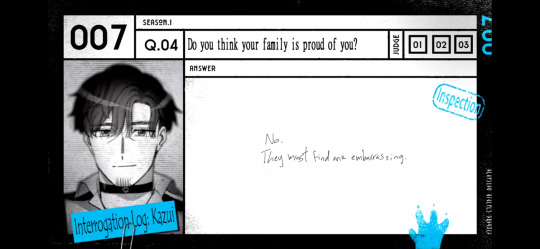
Marriage, Cats, and Doves
As everyone has discussed when this first came out, “Cat” shows a lot of different themes through cats, doves, magic, marriage, and apples. This section will go over the first three aspects.
Many have stated before that the dove represent his ring as, at the start, he turns his ring into the dove. Obviously, doves are well known for their symbolism of love, hope, and peace. While the dove is supposed to represent their marriage, I also think it ties with his wife, seeing how she seems to hope that their love will bring them happiness. Adding onto this, it also explains why he watched and invited the dove to fly onto his arm. He was “playing” or leading the dove to him. Then it cuts to his eye, blankly staring at the pristine white of the bird. Note that this eye is the same as the one at the end of the MV. It can be assumed that it represents how, at the beginning, he could suppress his true emotions and playing along, but at the end, he becomes feral and mutilates the bird. (Image below shows how different they take the marriage, he’s uncomfortable while she’s beaming with joy).
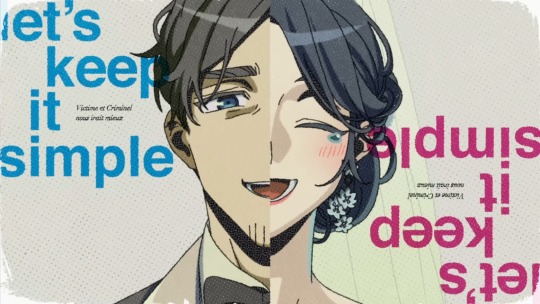
On the other hand, cats symbolize independence, intelligence, and cunning, something that Kazui shows throughout the MV through his intricate lies. I think he also has the “mannerisms” of a cat.

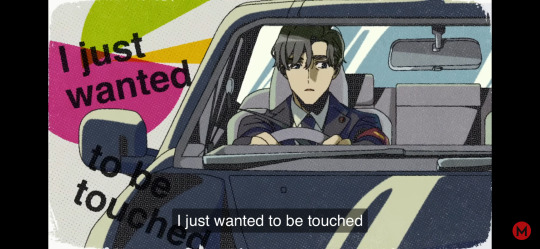
Here he says he “wanted to be touched”, showing his yearning to be in a comfortable, safe relationship with a man. However, due to gay relationships not being accepted back then, he is unable to experience this and becomes increasingly lonely. It’s similar to how cats are reclusive and tend to stay away until someone or something has something that interests them. (I’m not a cat expert so I might be wrong). While the previous lyrics do say “I just wanted to touch, to caress”, implying he wanted his wife, I think this is the wife’s thoughts who wanted to “caress” and “touch” aka get closer to Kazui. When the lyrics play, it pans over to her with the circles in the background pulsing quickly, referring to her quick heartbeat when she looks at him and how she desires to be with him.
Another theory as to what’s happening in that moment is that she’s assuming what he’s thinking. Kazui: “I just wanted…” Wife: “to touch, to caress” Kazui: “to be touched”. I also find it interesting that the circle from 0:27 shatters at 0:30.
The next lyric “So it’s wrong? Shove that!” Could be him wondering if wanting to be touched was wrong and “unmanly” of him. But, deep inside, he wants to scream out and say that he yearns for that feeling, that he wants to be loved, even if it didn’t fit the norm of “what a man should be”.
On to their really terrible marriage. There were lots of societal pressures to be married back in the day, so Kazui suddenly marrying a woman he didn’t even like was due to others expectations of him. Plus, Kazui wanted to be loved and he was feeling the consequences of loneliness, and this love she had felt for him seemed like an opportunity to somehow get what he wanted. A desperate attempt to receive love in a marriage he was fully disinterested in. 0:46 to 0:48 show this as he suddenly went from giving her flowers to wanting to marry her. It implies that he wanted this to go as fast as it could so he wouldn’t disappoint his family or be judged for being unmarried and gay, even if it costed his mental health and forced him to lie, which steadily declines throughout the MV until he finally cracks (further explained in 3).
The way he calls her his “victim” really says how he just used her to satisfy his own needs and also his extreme guilt for her death. This also foreshadows the coming violence as the perpetrator (cat) kills the victim (dove).
Lastly, him wanting to “keep it simple” is him hoping that she isn’t going to take their relationship super far. He wants to stay away from the more intimate part of the relationship, but it’s difficult since he just continues to lie and doesn’t talk about himself at all.
(I will be skipping ahead to the end as I want to save the rest of the details for later) Now we’re at the most famous part of the MV, him smoking and then absolutely devouring and mauling a dove. He most likely did all of this in a drunken state. 1) There’s a glass at 1:49 that slowly drops to the ground, possibly him losing his grip on reality or his literal grip on the glass thanks to drinking way too much. 2) From 2:13 to 2:19, he struggles to get up and holds his head, he even takes off his ring IN FRONT of her, something he’d never do if he was thinking straight because it would break his lies. (I’ll explain the drinking later on).
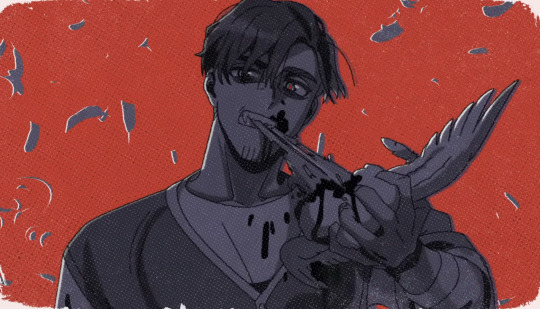
Finally, the violent part. We have no idea if the symbolism in this is exaggerated or if it’s 100% accurate, but judging from how much he hates himself, it’s probably over blown to an extent. So what does it mean? Well it definitely is supposed to show how he interpreted his outburst before his wife’s suicide. Him transitioning from perfectly calm (before smoke) to becoming this “evil” person (after smoke) is him showing that he doesn’t deserve forgiveness for what he’s done. Then, him killing the dove represents how he thought he said nasty or distasteful things. On top of that, it also represents how he believes he killed his wife by angerly venting his feelings out so much that pushed her over the edge, in other words, taking “chewing someone out” on a violent level. This is his interpretation of what happened though and I don’t think he exploded. Instead, I think he just made poor word choices. The two of them, or at least Kazui, lacked communication and due to his drunken state, he just blurted out what he was feeling. I don’t have any substantial evidence to back this up though, so take this last one with a grain of salt.
3. Magic, Masquerade, & Drinking
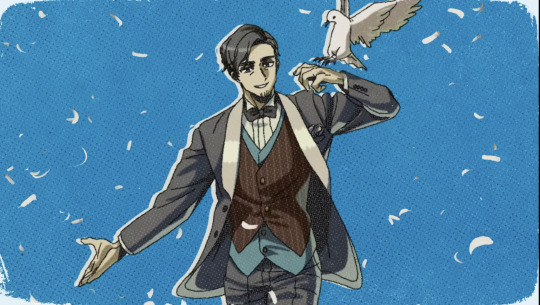
I LOVE the magic and masquerade symbolism in particular as it is pretty much how he views the whole relationship. He interprets his lies as these magic tricks that fools people on the outside into believing that yes he truly does love this woman. It’s also why he turned the ring into a dove in the first place, he just sees the marriage as a big magic show that he has to put on for as long as he can.
“Lie until it gets better, follow the king of masquerade.”
I really love this line because he refers to himself as the “king of masquerade”. He calls himself this because all his life, he’s been putting up these different personas and characteristics that aren’t him. It’s literally seen in “half” as he wear different clothing and keeps a mask on the entire time. He knows that if he were to drop this act, no one would truly accept him. He would be cast out and never have the opportunity to be loved again. So living a life of lies seemed to be the most viable option to him, but he also resents himself for it. He admits that he can’t live unless he lies, it truly is his only life line and a life line others rely on too (aka his wife).
“So l've tried to change! I've tried to change. I have tried to stop lying to myself and others! I've confided in others. I've tried to be myself! I've tried to just be the way I was born! It's not my lies that killed her. She's dead because I stopped lying to her! If I had just kept lying- She wouldn't have died..! I can't live unless I lie. That's how I was born... I'm pathetic, aren't I?”
As is the magician’s code, he can’t reveal the secret to his “magic”.
However, all this lying obviously takes a toll on him as in the latter half of the MV, he starts drinking and smoking more. In each shot from 1:12 to 1:46 he is always seen indulging in his addictions. It’s his way to escape from reality and forget about his current relationship. What I find most interesting though is the meal he has with his wife. It seems they are celebrating something as the Ace of Spades (which hovers in between the two as they speak) symbolize good luck, hope, and change. They’re even drinking champagne and having a nice meal. What they could be celebrating though is beyond me, they’re probably on their first or third anniversary considering they look older? Besides that, there’s also the most interesting clip of a man when he holds up his champagne glass. I think that this is supposed to show that he uses drinking for more than just forgetting about his current situation, he also wants to dream about a life he couldn’t have. A life with someone he loves. He probably tries to replace his wife in his head with another man by drinking, trying to make the “magic show” more tolerable. The man could also be his guilt starting to rise and bubble up like the carbonation in the champagne, sitting in front of him and judging him, telling him “Are you really going to keep lying to her after all this time?”.
Finally, at the end of the MV, he is unable to keep up his magic show anymore due to drinking way too much. All his “tricks” fall to the ground, another way of showing his masquerade mask has finally fallen. He then ends his first act at the start of the MV (aka his marriage) by tearing it apart.
4. The Bartender
Now THIS is an interesting thing people have pointed out. The bartender from the previous MV comes back for a cameo in the newest one. But it’s not just a small, little nod, no he’s full front and center in the frame.

Even more interesting is that he’s the only one with a wedding ring in the shot. I was really thinking that maybe everyone would have one as a way to show societal pressures, but this also works too.
This is the third time the man has shown up in Kazui’s MV’s. Though he might not have a face, it’s clear that he is of some sort of importance in Kazui’s life to show up so much, especially if he appears so clearly in “Cat”. Maybe Kazui wants to keep his identity a secret so he wouldn’t have to open up old wounds. With this information, we can assume he’s talking to the bartender from 1:13 to 1:24 as the table & drink is just like the one in “half”. There’s also the sound of a drink being prepared/served at 1:10. So he could very well be Kazui’s love interest as he carefully confesses to him. However, they’re both married, something that Kazui clearly remembers as he only sees his ring in the shot with all the guests. Though I think that, from this scene, he wished that they were the ones being married because he’s the only one with a ring, that is also similar to Kazui’s, on. That’s why he asked what he’d do if he said that he “liked-liked” him, would the bartender accept him or reject him? Although, I don’t actually think he’s drunk when he asks. Maybe he’s had a few drinks, but his speech is way too clear. Remember he’s also the “king of lies” so no one can really be sure of his true nature. His likely reasons about lying about being drunk is because 1) there are possibly people around and 2) he’d rather not embarrass himself if the bartender didn’t respond at all.
Now comes the tricky part, who is the bartender? The most common answer would be his be his childhood friend, and I’d have to agree. There really is no other person to identify him as and it would make the most sense as to why he appears so much. In “Interrogation Question 8”, he mentions that he “looks up to [his childhood friend]” implying that he could be older. If we’re willing to stretch this and say that age is shown through facial hair and the fact that the bartender possibly owns the establishment (Kazui mentioned his friend owned a boat, what kind is not mentioned, but it does say something about the man’s wealth), then he could very well be the childhood friend. At some point though, he seemed to stop going to the bar. Most likely because his friend responded badly to his “confession” or that they already knew it wasn’t possible and Kazui didn’t want to see his face anymore since he’d only feel even more lonely than he already was, thinking that what he had said ruined their friendship forever. It then cuts to him sitting alone drinking whiskey, something he always buys at the bar. He states that he “wanted to ask so it’s out in the open. I just got a little greedy.” This implies that he wanted to “let it slip” in his “drunk” state. However, it didn’t go very smoothly and his greed only brought him more pain.
There’s also a thing with whiskey in that whenever he has it he seems to be allow his masquerade mask to fall. It’s probably because it reminds him of his childhood friend who he loves as he always buys the same drink from his bar. The scenes where whiskey appears is the previously mentioned confession scene followed by him sitting alone. It also appears when he becomes feral as it is the beverage he drops at 1:50.
5. Apples
This one has been discussed the most and I honestly don’t have anything new to bring to the table with it. But I’ll just add it in here
First let’s start off with the symbolism of the red apple, which is pretty easy to pin point. In the MV, It’s only used in the middle after he pulls the cloth off of the wedding couple (aka Kazui and his wife) and at the end when the wife dies. There are an abundance of the red apples at the wedding, representing how much love she has for Kazui. Then, when she dies, it’s squashed, and it’s supposed to show her impact onto the ground and their love being ended right there.
The green apple is slightly harder to figure out. It seems to represent how Kazui feels about the relationship and how he only likes her platonically. The green apple appears in the abundance of red apples, underneath Kazui during the dinner, and, most importantly, as a man. The first two can be easily interpreted as him trying to keep his platonic feelings a secret. He even literally tried to keep it under the table to hide it from her. Then, there’s the apple-man(?). The first meaning of this is how he, again, sees the wife as only a friend. However, there’s also another meaning. The drawing takes great amounts of inspiration from the painting The Son of Man, by René Magritte, which makes sense given the similarities the MV and the meaning behind the painting. Magritte said,
“…You have the apparent face, the apple, hiding the visible but hidden… face of the person. It's something that happens constantly. Everything we see hides another thing, we always want to see what is hidden by what we see. There is an interest in that which is hidden and which the visible does not show us. This interest can take the form of a quite intense feeling, a sort of conflict, one might say, between the visible that is hidden and the visible that is present."

This painting’s meaning has so many parallels with Kazui’s character, almost as if the writers wanted us to realize it since the introduction of the green apple in “half”. The biggest difference between the two is that Kazui does not reveal his eyes. He keeps who he really is behind the apple, keeping who he is a secret and preventing any sort of “intense feeling” of wanting to get to know the true him. He doesn’t want any conflict to arise and fears the consequences of coming out.
6. Extra Details
I Wonder why at the start, he kind of just stares at the screen like he’s judging/hoping that Es will make the right decision. It’s also reminiscent of how he stared at Es in his 2nd Voice Drama. Very strange but I like it

I love it when there’s similar scenes fr fr
Another thing id like to bring up rq is Kant. Es brought him up in Kazui’s 2nd voice drama since he had “killed” someone due to his lies. Es directly quotes him, “That would be Kant…A philosopher who stated that lying is inherently a sin, no matter the circumstances…Apparently, even if your friend is being chased by a murderer and the murderer asks you about their whereabouts, you shouldn't lie, according to Kant.” Kant’s reasoning for selling out your friend to a murderer is that if you were to lie about where they were and by chance the murderer found them, it’d be your fault. However, if you did sell them out and they died, it wouldn’t be your fault, your friend should’ve just avoided the psycho! This is what Kant believed and, personally, it makes no sense, especially if we’re considering a human life that’s on the line. Brushing over that though, the connection Es essentially tries to make is that Kazui’s lies are his greatest sin and that he should’ve told the truth from the start. While yes, most things would’ve been prevented if he had tried to be more true to others, there are also standards to consider as well. If Kazui had come out, then he’d be shunned, if he refused to marry, he’d be shunned, etc. so there wasn’t an easy way out for him. Kant’s philosophy fails to consider any other situation or being truthful to one self. His murderer example is way too extreme and it doesn’t hone in on the finer details. Which is why I don’t think Es really knew wtf they were talking about and I honestly find the Kant thing kind of dumb💀
The comments in this video explain how dumb Kant is way better than I can vv
youtube
Constructive Criticism, Thoughts, and Additional Help is Appreciated, Thank You!
#kazui milgram#kazui mukuhara#007#es milgram#Milgram#theory#I Hope this isn’t too stupid dumb dumb#text post#symbolism#Youtube
27 notes
·
View notes
Note
I have a question regarding the Witness' motivations and emotions, particularly in response to Byf's interpretation of them (not to be derisive of Byf, I enjoy his content.)
In two of his videos regarding the Witness and its goals, Byf discusses the idea that the Witness is obsessed with control, with dominating both its enemies and its own forces, imposing its will on the universe. However, I feel like this has ignored some of the points that have been raised by other lore analysts, mainly the idea that the Witness seems to view suffering itself as a cruel fate, and that through exercising its will to conquer and either destroy/subjugate species, it is leading to the endgoal of either reducing existence to lifelessness, or escaping the universal cycle of life entirely.
What is your opinions on this? I lean more towards the idea of the Witness being disgusted with the 'cruelty of living,' which has some basis in the rage that Mara felt in the Inspiral entry dealing with her encounter, and it is trying to impose its own 'Final Shape' of universal simplicity in order to try reduce all living things, thereby in its own view reducing suffering. The idea that the Witness simply seeks to control everything seems somewhat reductive.
Apologies if this question appears vague or fragmented.
Yeah, I agree that it's probably more complex than just control. Control is definitely a part of it and a very big part, but I also feel there's more to it. The single-minded focus on achieving the Final Shape, to me, seems like more than just the Witness trying to simply be in control. I feel like it genuinely believes into what it's trying to do. The kind of a bad guy who think they're correct and that they are making things better sort of thing.
Especially with how it talked to the Traveler, or rather the Gardener. Saying "be free." That's the opposite of control. As you said, the bit about the cruelty of living seems to be a huge point for it. It said something about it in WQ and it said it again to the Traveler in Lightfall. A bit post-Lightfall, I believed that the Witness' Final Shape is to revert or remove the rules of the game placed into the universe by the Gardener. Return to how things were before the universe existed, possibly start anew. It's still an interesting theory to me! It would mean that the Witness genuinely just wants to start over and thinks everything and everyone would be better for it. More than just wanting to be in control of the universe. Again, control plays a part 100% but I feel there's more to it than that. Especially given the whole "rage" thing.
Hopefully we'll get to learn more about the Witness soon!
21 notes
·
View notes
Text
Manga With Me: MHA Pocket Theory
A Walk in the Forest
⚠️ Spoiler Warning: Discusses chapters through 322. No major plot points just some sweet, sweet character development.
I didn't go down this rabbit hole until @amardahlia commented on this post and now everyone has to think about this as well.
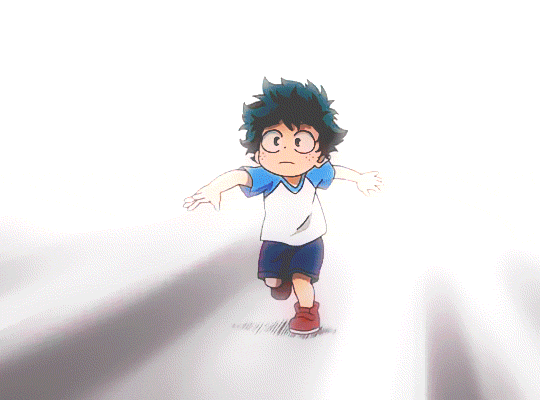
This scene has popped up in the manga many times as a recollection of the relationship that Bakugo and Deku had as children but it wasn't until I looked back to source the actual chapters that I realized that they have something in common. This is a memory held by Bakugo.
Why is that important? Well, chronologically, as pointed out by @amardahlia, the memory shows the two of them getting further and further apart even though we know that their relationship actually improves over time.
Historically, When Bakugo recalls upon this memory, it's never framing up their childhood "friendship". More to say, "this guy could never keep up with me when we were younger," than "this was a fond memory". In fact, it's typically what he recalls as he's puzzled by Deku's burgeoning strength and power as it is eclipsing his own. This scene is an indication of their rivalry or competition in Bakugo's mind. Never one to wait around for the weak, look at how Deku trails behind Bakugo. It's not even apparent what they're doing or where they're going. All Bakugo knows is that he leads the charge.
We've also seen that Bakugo's interpretation of past events between the two of them tends to be heavily skewed by an egocentrism steeped in insecurity (and maybe self-loathing). In one of the core memories that they both share, he mistakes Deku's genuine concern for condescension, equating the need for help with weakness. This sours the relationship and Bakugo constantly assumes he's being looked down upon or being made fun in instances where Deku is trying to connect to him.
I wouldn't be surprised if the reason they're getting further and further apart as the gap in their relationship is built is because, even though Bakugo reaches a level of respect and understanding with Midoriya, he can't help but still compare himself to him either. He recalls them being further and further apart to his own detriment. Now, instead of reveling in their power disparity, he's now constantly thinking about how far behind him Deku started and, subsequently how quickly he's been powering up. I believe that remembering it inversely in this way illustrates a growing unease and dissatisfaction with himself despite the positive change in their relationship.
Ultimately, all roads point back to Bakugo, obsessed with being victorious (his name reinforces this), constantly grappling with the idea that his strength may not be enough. He may not be enough. I reflect on this a bit here. For all his bluster and bravado, Bakugo is just wracked in self-doubt and insecurity and while this consumed him early on and reinforced an unhealthy dynamic between he and Deku, he's come a long way in mitigating that.
Prediction
This is also hopefully a good enough apology to @hxneyrosie who was having a good day before I opened my mouth on the internet.
I think that, by series end, we're going to find the reason why Bakugo refers back to this specific memory. Personally, I think that they're lost in the woods. I think Bakugo, with his predilection for mountain climbing/hiking, may have gotten them lost in the first place. But I also think that, as Deku's concern and fear around the situation grew, Bakugo kept his cool just like a hero would (despite also being scared) and led them out of that forest. He may have even comforted Deku which is how he initially began associating the need for help with weakness in the first place. Like, in his mind, "not only could he not keep up but he needed me," and that was another 1 in the Win Column for Bakugo. This would also presumably explain how, later, when Deku reached out in concern, he worried that Deku was looking down on him. Because when the roles were reversed that's exactly what he did.
Receipts and explanation for everything above the prediction are down below if you’re still curious 👇🏾

Chapter 9: Deku vs Kacchan
Context - While the chapter starts with Deku talking about growing up in the same neighborhood, this scene in particular is actually a part of Bakugo looking back on Deku being a mere pebble along his path to becoming a hero. The quotes I removed were, "Your quirks so cool, Kacchan. Hope I get mine soon." to which Bakugo responds, "Whatever you get, no way it'll beat mine."

Chapter 117: A Talk About Your Quirk
Context - POV is ambiguous but I think the distortion of this memory comes as Bakugo's rage is simmering. He walks in silence in response to Deku's prompt while he's preparing to confront him. He's confirming his sneaking suspicion about the origin of Deku's sudden quirk development while also low-key reconciling his guilt from the events at Kamino Ward and it's all a bit much to bare. The recent turn of events challenges Bakugo's sense of self right as they hit a critical breaking point in their relationship. In his mind, the memory is at odds where Bakugo finds himself at a steady decline while Deku has begun to usurp that which he feels entitled to. Even the visual leading up to this moment of Bakugo leading Deku is just - 🫠

Chapter 275: Encounter, Part 2
Context - Heading to the first Shiggy Showdown, Bakugo chases after Deku to act as support under the guise of getting even after ending All Might's career. He recalls this memory while contemplating Deku's growth and his determination (and difficulty) to keep from falling behind. In fact, this visual precedes him taking a decisive leap ahead of Deku just to show himself that he can keep pace. This fight with Shigaraki ultimately ends with Bakugo being impaled when his body moved all on its own to protect Deku.
#manga with me#bkdk apology tour#bakudeku#bkdk#dekubaku#dkbk#deku and kacchan#deku#kacchan#mha#bnha#my hero academia#manga#boku no hero academia#class 1a#mha deku#mha bakugo#bakugo#manga analysis#anime#manga theory#bakugo katsuki#izuku midoriya#bakugo analysis#midoriya izuku#katsuki bakugo#character analysis#manga with me mha
119 notes
·
View notes
Note
https://www.tumblr.com/eisforeidolon/728741971448954880/it-also-needs-to-be-reiterated-that-bi-lighting
You already covered this really well, but a little extra discussion on "bi lighting," and how stupid it would be as a way to demonstrate a characters sexuality. For one thing, say in the bar scene in season 15 of Supernatural where Dean is visiting his old friend. He’s not the only person in that scene, so is everyone in that scene bi?
Also, I know that filmmakers use colors to evoke moods and make us feel things, to draw focus, etc, but that being said, 8% of men and 1 in 200 women (according to a quick Google search) are colorblind. So, they are going to use color cues only to tell us someone is bi, but not actually make them, you know, attracted to the same sex at all, but just use the color as a clue. I get that not a huge amount of people are colorblind, but I know quite a few who are, myself included. But still, show runners are going to do things like put characters in "bi colored shirts" and light them with "bi lighting" but not actually say it out loud? Not to mention, I am sure there is a considerable amount of the general audience who won’t automatically knows the colors of the bi flag, and if they don't know them off the top of their head, they’ll have no reason to look up color choices of shirts and stage lights to check. So, now colorblind people and people unfamiliar with the bi flag colors aren’t going to know your character is "bi." That’s not the entire audience, of course, so maybe that’s fine, but then you also have the people who just watch a show to enjoy it and aren’t actively looking for parallels or clues about characters. These viewers are just, you know, watching the show. They are doing this crazy thing where they watch the action and listen to what the characters say (not what they wear unless it funny, out of character or otherwise stands out in some way) to find out information about the characters.
Anyway, I don’t have anything profound to add, just wanted to add weight to the absurdity of big lighting, and help demonstrate why hellers are delusional.
It doesn't need to be a profound addition to make it worth continuing a discussion. I mean, I don't think I was saying anything really new in the first place, but sometimes, especially in a fandom so full of really bad interpretation? I think it's a good idea to keep pointing out all the ways it obviously all falls apart if you actually look at it.
At the end of the day, it just comes back down to the fact that subtext and symbolism simply don't work like that. You don't tell a story ONLY through symbols that could potentially have a multitude of other meanings (if they're significant at all) and ONLY count in terms of one of many characters they could apply to. You don't tell a story ONLY through symbols large parts of the audience will not catch - or may not even be able to catch. You definitely don't tell an extended story ONLY in the subtext contradicting the directly told main narrative. These kinds of theories always rely on a fundamentally flawed and frankly bonkers assumption a canon's writers are telling a secret hidden story that will only be satisfying for the fraction of super special people in the audience *cough* clever and dedicated enough to decipher it being hinted at for years and years without materializing in the actual narrative. In this case, a CW tv show's writers where the previously on segments made it clear they sometimes didn't trust the audience to remember what happened an episode ago writing a hidden story across fifteen fucking seasons (since they insist there were totes hints in the first three, too). Yeah.
I admit there's an evil troll part of me that almost wants to go write a D/C fic where Dean and Castiel treat each other just as they do in canon, but I constantly include background detail nonsense like bi lighting from their meta. Then in literally only one line at the end of the final of many long chapters, apropos of literally nothing building to it, shove in something vaguely romantic and just end the fic. Because I'm sure they know damn well that would be an absolutely shit excuse for a story, and wouldn't be shy about saying so - if it was divorced from their campaign of "proving" their ship totes exists (or they deserved for it to exist) in the canon. But I won't because I'm lazy and not that much of a dick.
7 notes
·
View notes